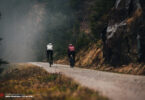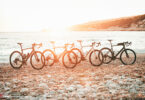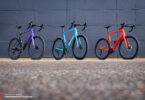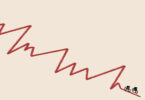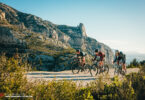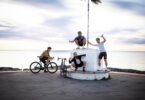It was an adventure of firsts. My first time lost with a bike in a sandstorm, my first night in the desert under a sky full of stars, my first time being held hostage. Here is the story of my spontaneous and very epic 21 days of bike packing through West Africa. From Morocco all the way to Gambia.
This wasn’t penned by one of the core editorial team at GRAN FONDO, it’s a story that has come straight from the community. If you’re interested in contributing your own adventurous, inspiring or unusual story and give us a window into your bike scene, make sure you check out our contribution guidelines and get in touch.
How it all began. I blame cycling
Long hours on the bike are the best time to let the brain waves flow and come up with great-stupid ideas. It was one of those rides around Girona when I wondered ‘why ride around in circles when I can ride my bike from one amazing point to another’ and this is how a bikepacking adventure that would change my view on so many things in life began.
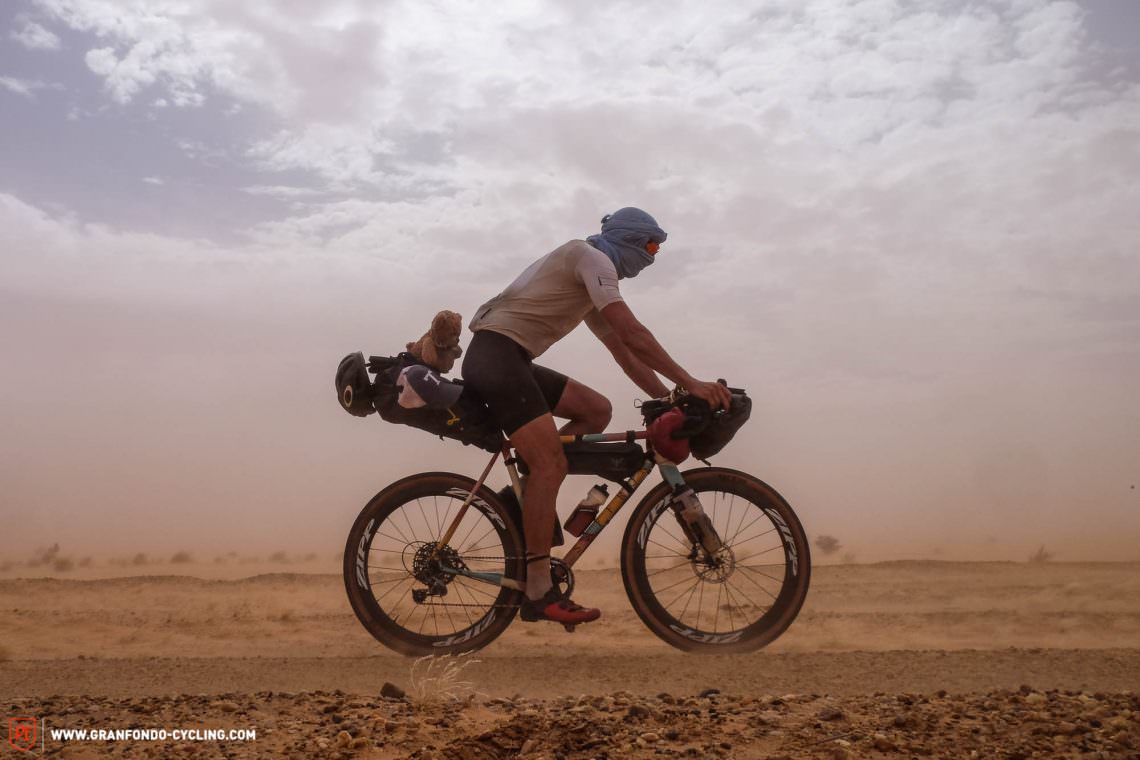
No clue but a saddlebag full of ambition
3 weeks later I am stepping out of a hostel room in Agadir, Morocco. Next to me my buddy Thorben, underneath me my gravel bike packed with everything I thought I might need for a bikepacking adventure through the desert, my head filled with dreams and great ideas. I wanted to see camels, spent tent nights under skies full of stars, learn how the locals live and eat and if the legs were really, really great, maybe even make it all the way to Senegal.
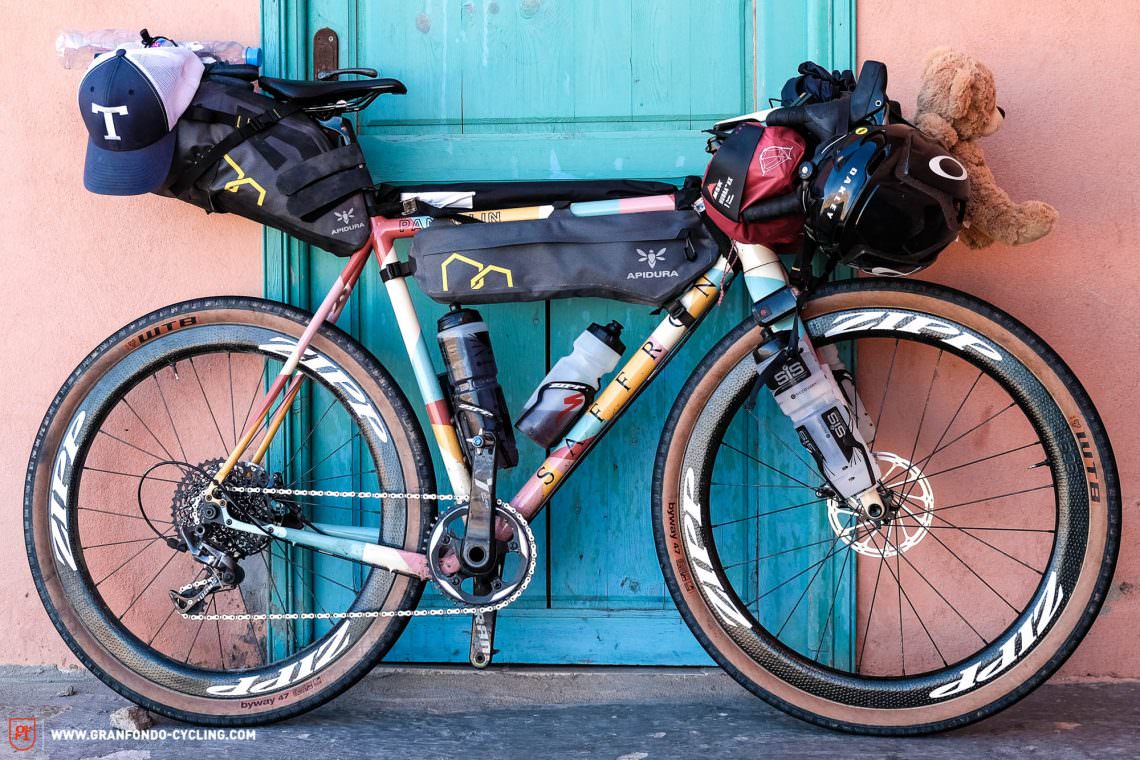
The biggest enemy of my even bigger dreams was the fact that I had never done a trip like this. I literally bought the tent, the bikepacking bags, air mat, etc I was now carrying with me, only days before leaving. Until the night before flying to Morocco, I had never even packed the bags to see if everything fits and how it works.
Next I know, I am sitting here on my bike, chasing the local vegetable transport down the roads of Morocco, riding into the unknown. Carrying a tent but absolutely no plan where to sleep at night. Other than in my tent. Obviously.
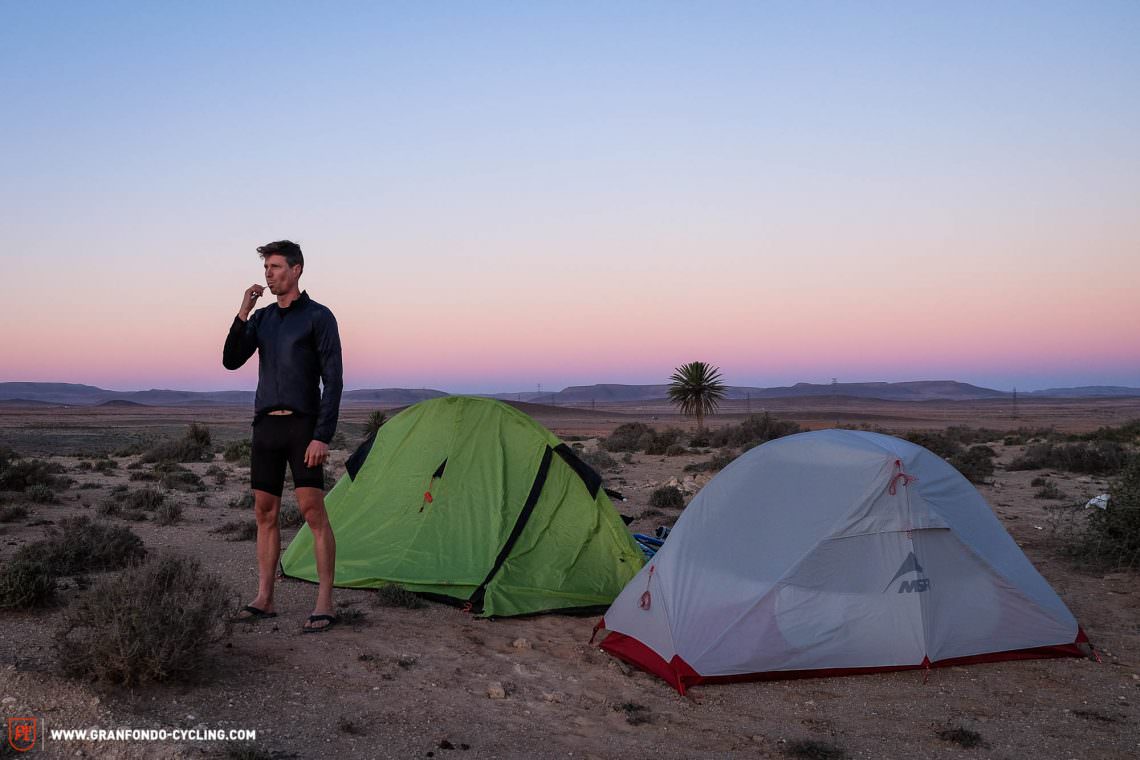
With high hopes of 180-200 km a day, we make it around 160 km on day 1 and we end up at the foot of the Atlas mountains. Locals highly suggest not camping out in the hills but frankly, the last little village we saw looked less appealing than camping out in some rock field in the mountains. We are taking our chances and get rewarded with an amazing night and even better sunrise in Morocco.
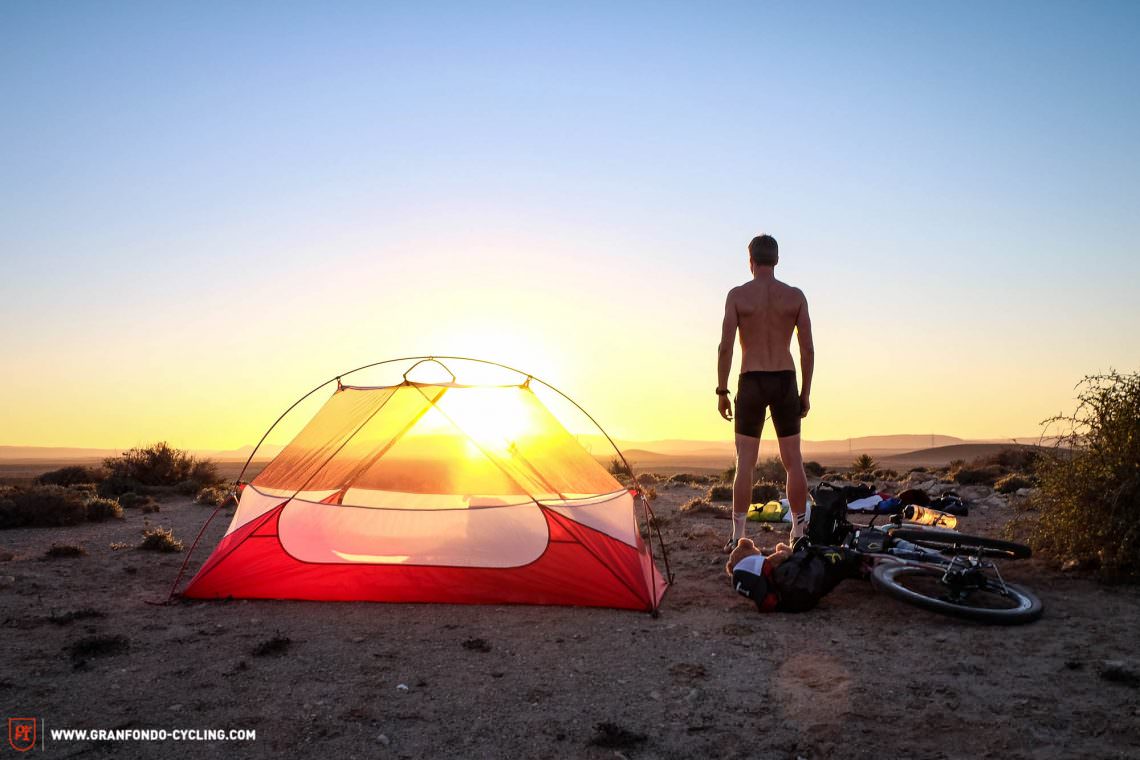
What a welcome to our trip and what a great experience instantly being thrown into the deep end. I am not going to lie, coming from a spoilt, comfortable and cushy life in Germany, I could feel the tension of the unknown inside me during the first night.
Chasing for the gate to Western Sahara
I came to Morocco to prove that all the stereotypes we carry and the lingering fear inside us has no foundation and is made up of a lack of knowledge and ignorance. I think during the first night I needed to convince myself more than anybody else.
Well, this first night did the trick and by the time I woke up, I felt more excited, free and energized than in a long time. I felt pure happiness and excitement looking forward to 3 weeks of adventure lying ahead of me and boy did I not have the slightest idea what was really waiting for me in these 3 weeks.
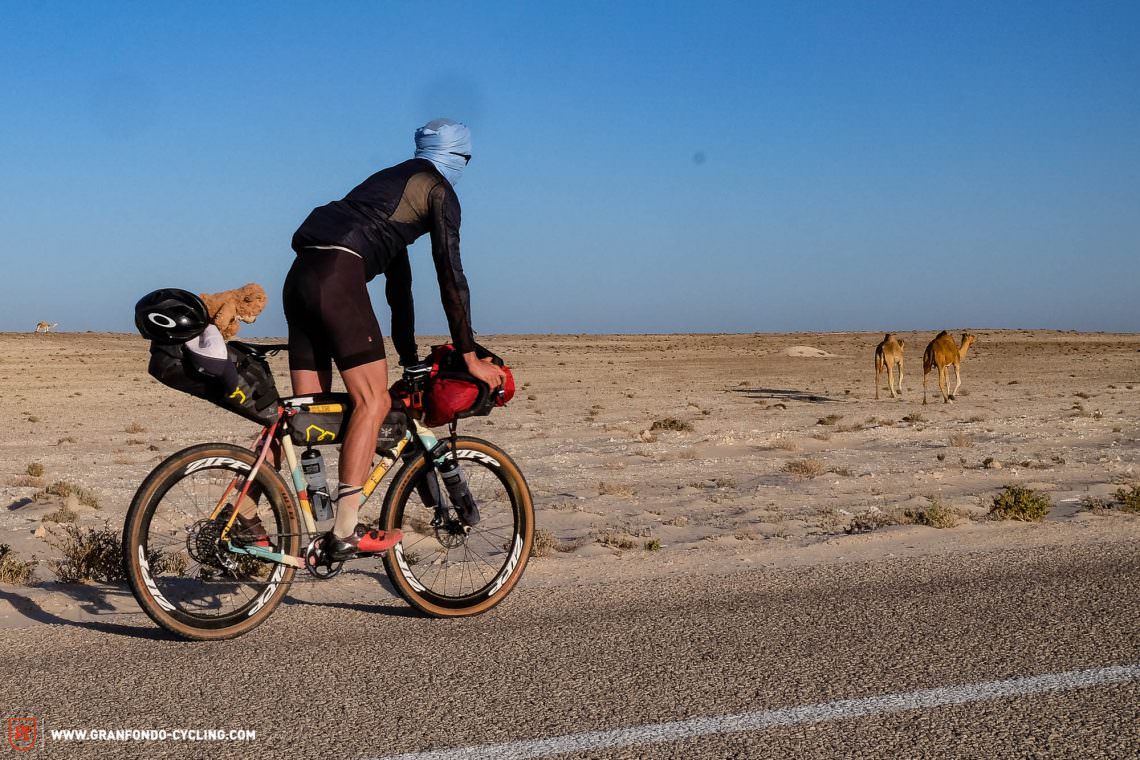
We headed back onto the bike early in the morning, chasing pavement in the direction of Guelmim, the gate to the Western Sahara region. I was really surprised by the road conditions, allowing us to make good mileage every day, despite battling the heat, the unknown feeling of a 40 km bicycle system weight, and some serious climbing in the first days. The motivation was high, knowing once we make it to Tan-Tan, most of the climbing would be over and we’d be cruising along the coast … so we thought. Little did we know what the desert had in mind for us.
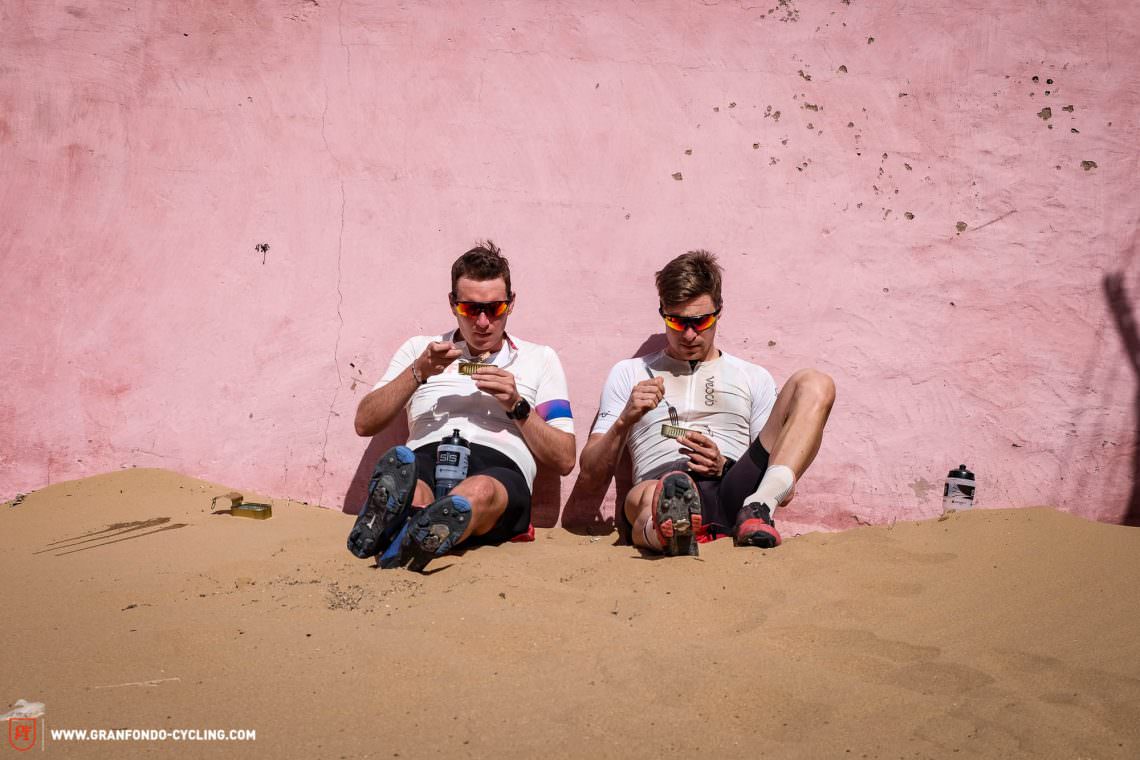
We finally made it to Tan-Tan on New Year’s Eve. I was adamant to spent the night in the desert and waking up under the stars for the beginning of 2020 but after a long day in the saddle, I had to admit to myself that I was riding my buddy Thorben into the ground. He had been suffering from an upset stomach the night before and we started losing solid distance compared to our daily plan. We spent the night in a hotel, hoping his stomach and body would recover. It would not but there was no stopping. He was on a timeline and needed to make it to one of the airports along the route (and guess what, there isn’t that many in that region). We set our sights on Dakhla, a little peninsula in Western Sahara that has become a hotspot for kitesurfers and retired Swedes and Germans spending their winter there.
The first sandstorm hits
Upon leaving Tan-Tan we made it to the coast quickly. One last climb for a long time ahead of us, we expected to see the ocean very quickly. Instead, we were staring straight at our first sandstorm and the only way was through. Who needs a smokers lung if you can inhale tons of sand. Not exactly beneficial to Thorben’s stomach situation.
We continued our journey to Tarfaya, chased by dogs protecting their owners’ land along the coast. We passed little fishing villages. Huge tent cities, occupied only by fishermen and the same picture at every village. Unbelievable amounts of plastic and trash right outside the city gates. We could see and feel the poverty and inhumane living conditions as we fought our way towards Dakhla.
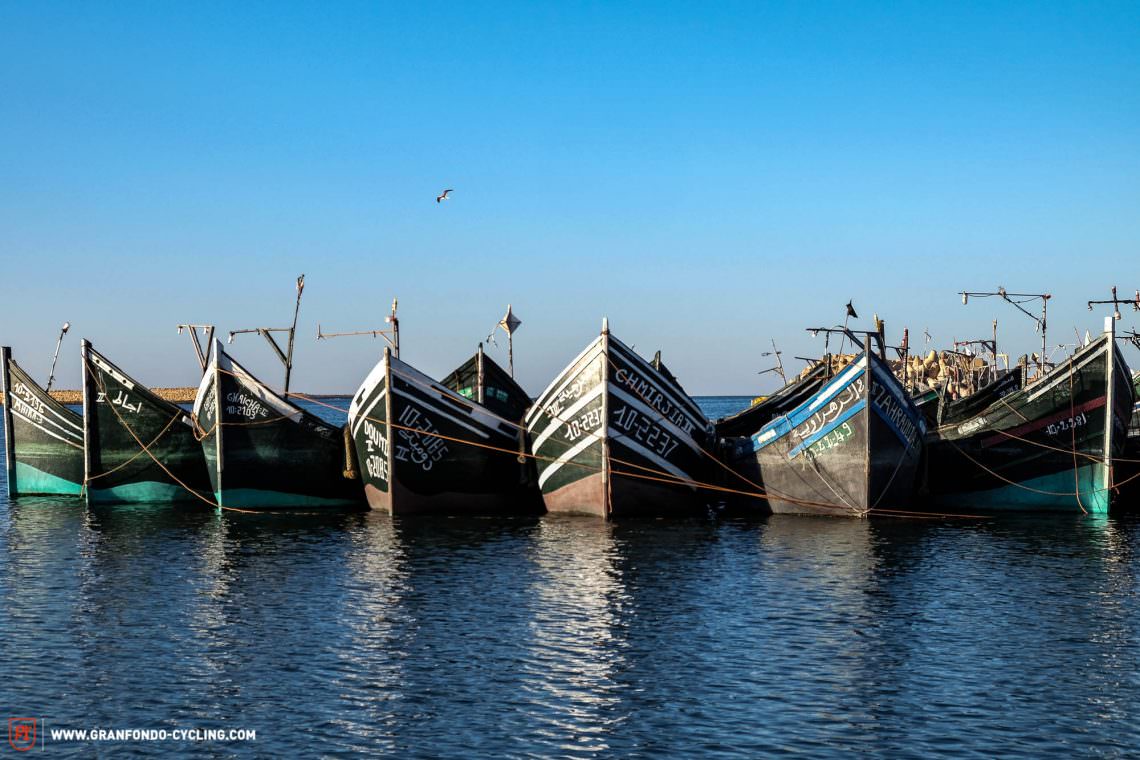
Western Sahara was taken over by Morocco starting in the 70s with the Green March, when somewhat 350,000 civilians and 20,000 troops marched into Western Sahara to build a Moroccon presence. Entire cities were built, many of which would never see a single sole move into. Cities, horse stables, and even a ferry line to the Canary Island were started, which quickly closed again after the ferry sank just outside Tarfaya. It is a surreal picture riding through Western Sahara with the desert taking over many of the uninhabited villages, dunes making their way over 3 meter high walls of horse stables, and the remains of construction trucks and cement mixers fading away, left behind in the desert.
After leaving Tarfaya we had to make the decision to take the new main road inland to Port de Laayoune or the picturesque coastal road. We opted for the coastal road and while I do not know what the main road is like, I believe to this day it was a really, really stupid choice.
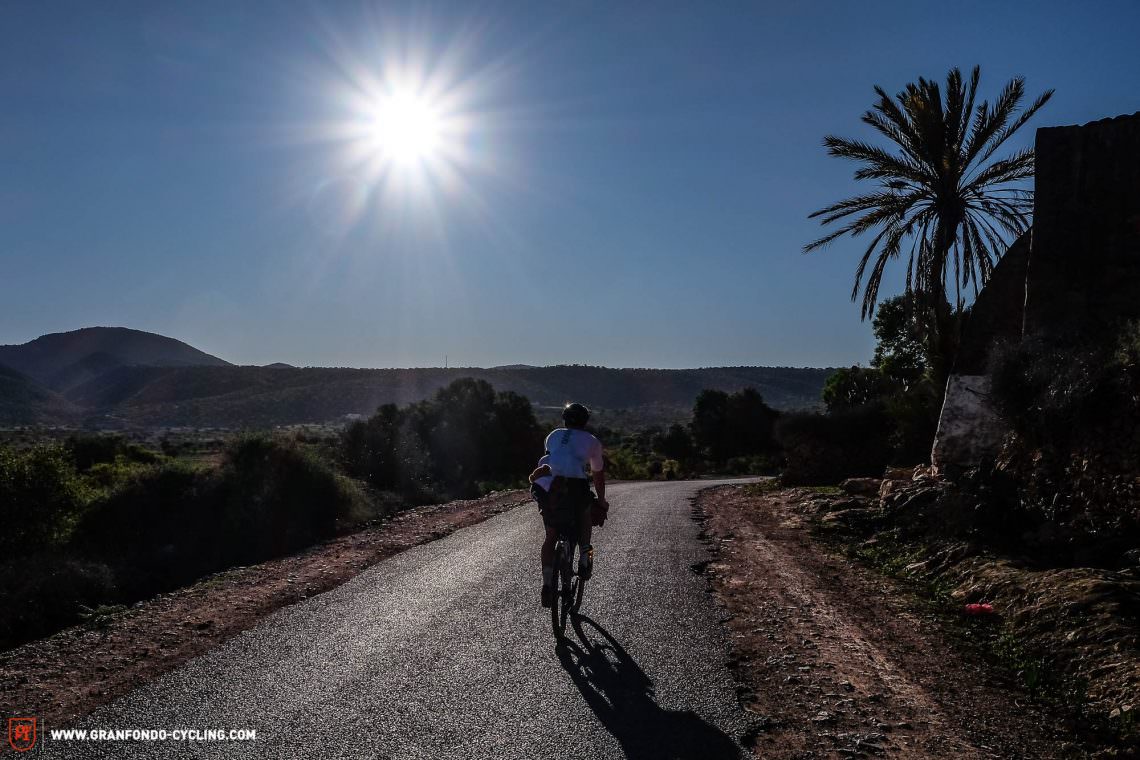
The sun was absolutely burning down, there wasn’t a single tree or source of shade other than the small relief road signs would offer. The headwinds were relentless and while the sand swirled around by the wind was a burden already, every truck that came by threw that sand into our faces with 80 km/h. To say it mildly, it was an unpleasant day. Turns out this route was the main trucking route as it was shorter than the main road. The headwinds were so strong that our average speed dropped to around 20 km/h which meant eventually running out of water and food, leaving us starving and dehydrated for the final 20 km. Eventually, we made it into Port De Laayoune just before sunset.
The trip is beginning to change me
It was there I realized how much that trip had changed me already. Feeling tents camping in the mountains the first night and making sure we left any cities before sunset to find a hidden place to put up our tents, we now roamed the darkest corners of Port de Laayoune in the middle of the night, walking freely in the search for food. We almost felt like the locals and once again we learned that most of our fears are built on ignorance and fear of the unknown.
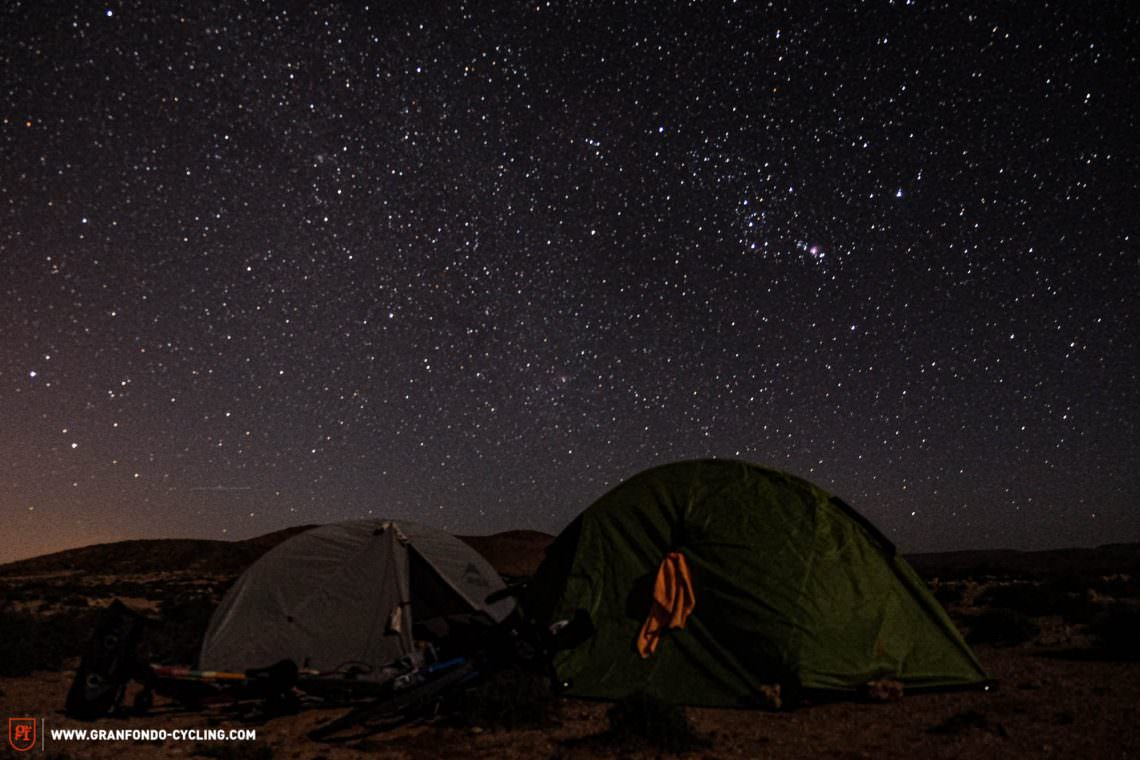
The next day we continued our journey towards Dakhla. With Thorben fighting for every kilometer. I think by then he had barely eaten more than a Snickers bar a day for the past 3 days. The desert got more and more remote and poverty more and more obvious. We eventually made it to the peninsula of Dakhla, flying down the final 40 km along the peninsula at an easy 40-45 km/h. It became very clear very quickly why this was a kitesurfers paradise, but my only thought was ‘I need to ride this back into the headwind tomorrow to make it to the main road 40 km away’.
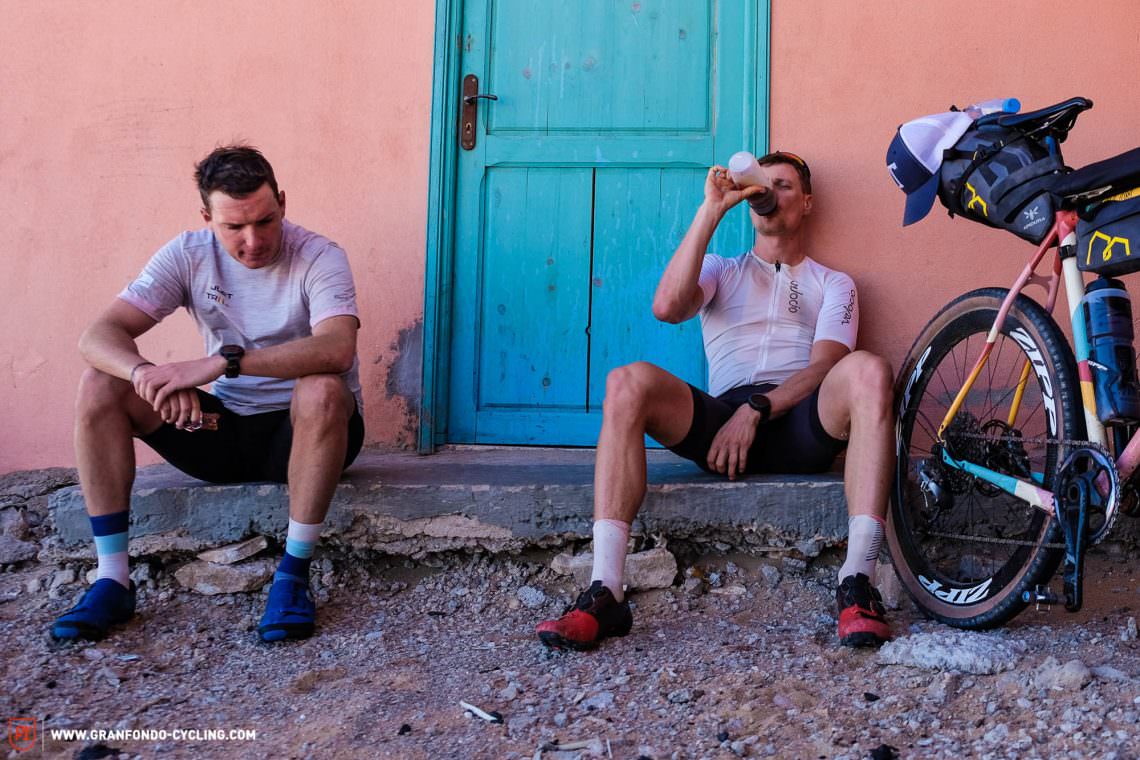
Now there is only me and myself left
After saying goodbye to Thorben, I headed out into the headwind and the real adventure just began. I was on my way to Mauretania. Very slowly though. The headwinds were brutal and the 40 km took me almost 4 hours. At the police checkpoint halfway into the peninsula, the officers offered me a refill for my water, making sure I was ok. Cyclists are not the most common sight in this region.
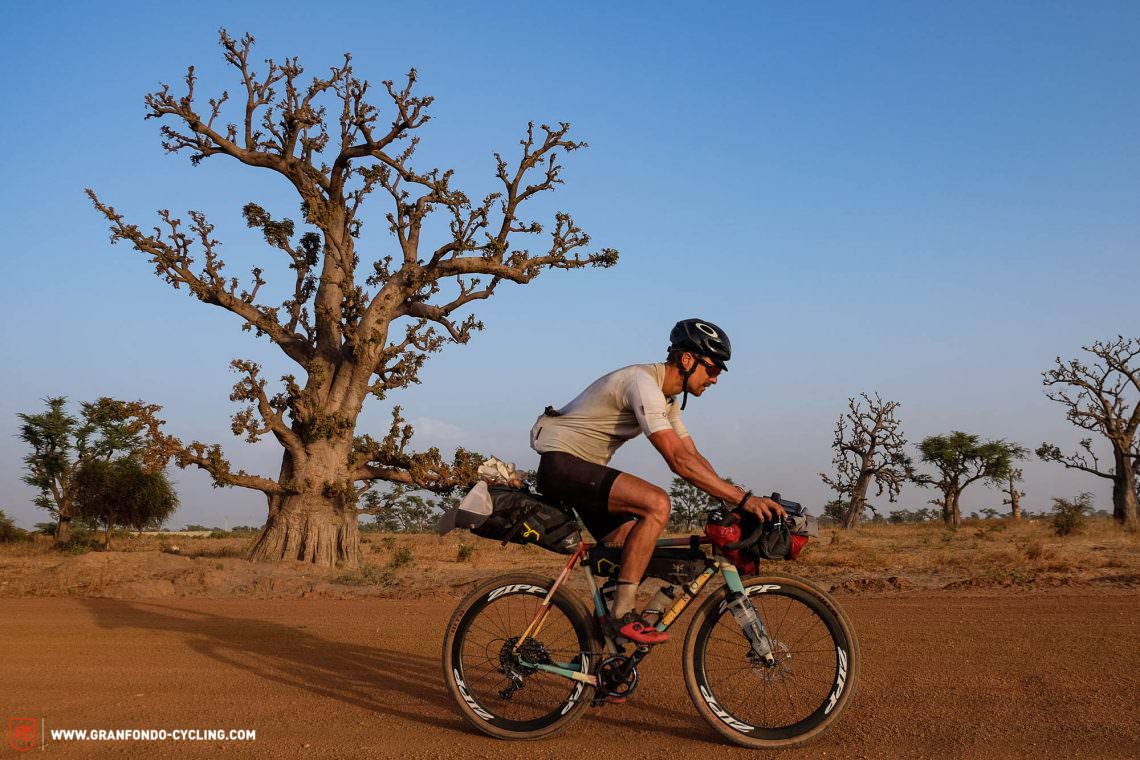
It is an odd thing as a European with the police checkpoints. All the way from Morocco through Western Sahara to Mauretania there are police checkpoints every 50-100 km. Every time you have to stop and show your passport or hand over a so-called Fiche. A prepared piece of paper with your passport and travel data on it. They inquire about your route and pass your travel plans along to the following checkpoints. I heard from other cyclists that the police at the checkpoints would often refuse to let them pass if it was too late in the afternoon and tell them to put up camp at the checkpoint and continue the next day. Sometimes they would even send out search troops if cyclists did not make it to the next checkpoint until sunset and if they found them they would spend the night in their car next to the tent, watching out for the cyclists.
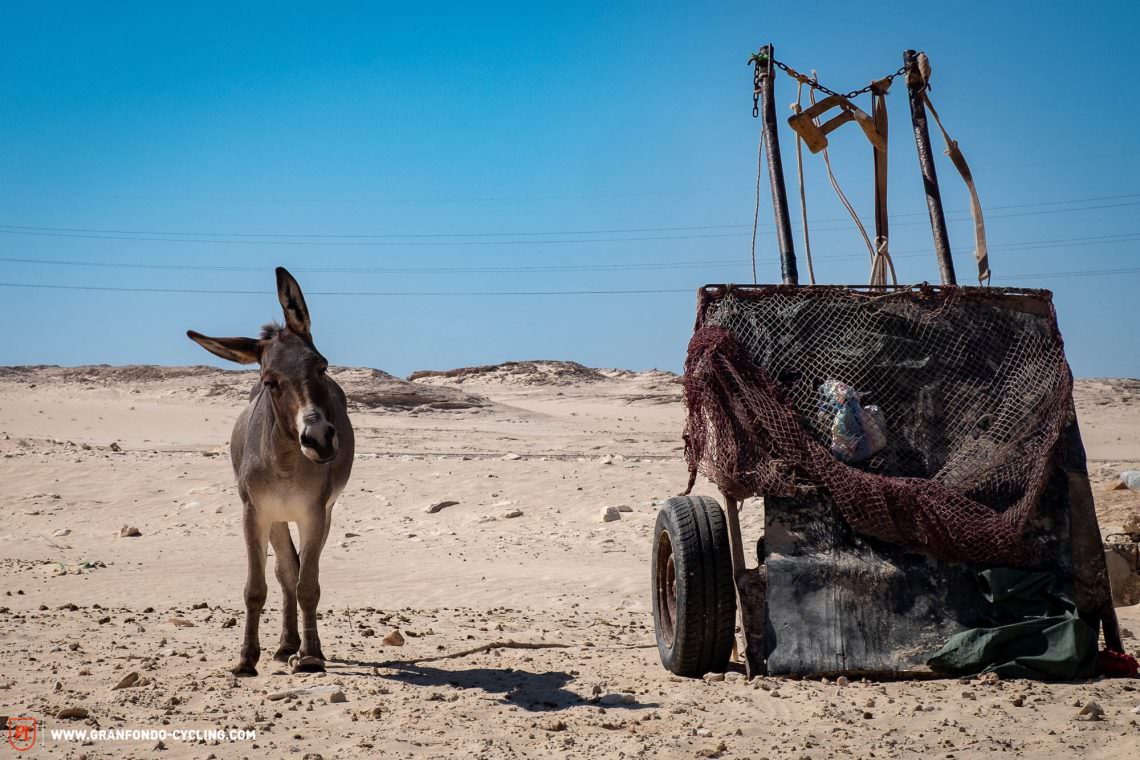
I benefitted from the fact that cycling isn’t a big thing in the region. Most bikepackers down there would ride heavily packed bikes and travel around 100-120 km a day. I was carrying merely a saddle bag, handlebar bag, and half frame bag, making up to 260 km a day after leaving Thorben behind, averaging speeds of 30 km/h or more. I managed to impress several late afternoon checkpoints with the ‘big looking numbers on my Garmin’ and was allowed to continue forth anyways.
A day after leaving Dakhla I was looking at the longest stretch of desert road without a single opportunity to refill water or food. 180 km of absolutely nothing but heat, sand and wind. I stocked up, put the head down and tried to make it through before sunset and I did. I got lucky with the wind and lucky with one of the few cars coming by on a long day in the saddle, handing me a bottle of water out of the driver’s window before continuing their way but not without telling me their political orientation. The closer to Mauretania I got, the more obvious the Western Sahara conflict becomes.
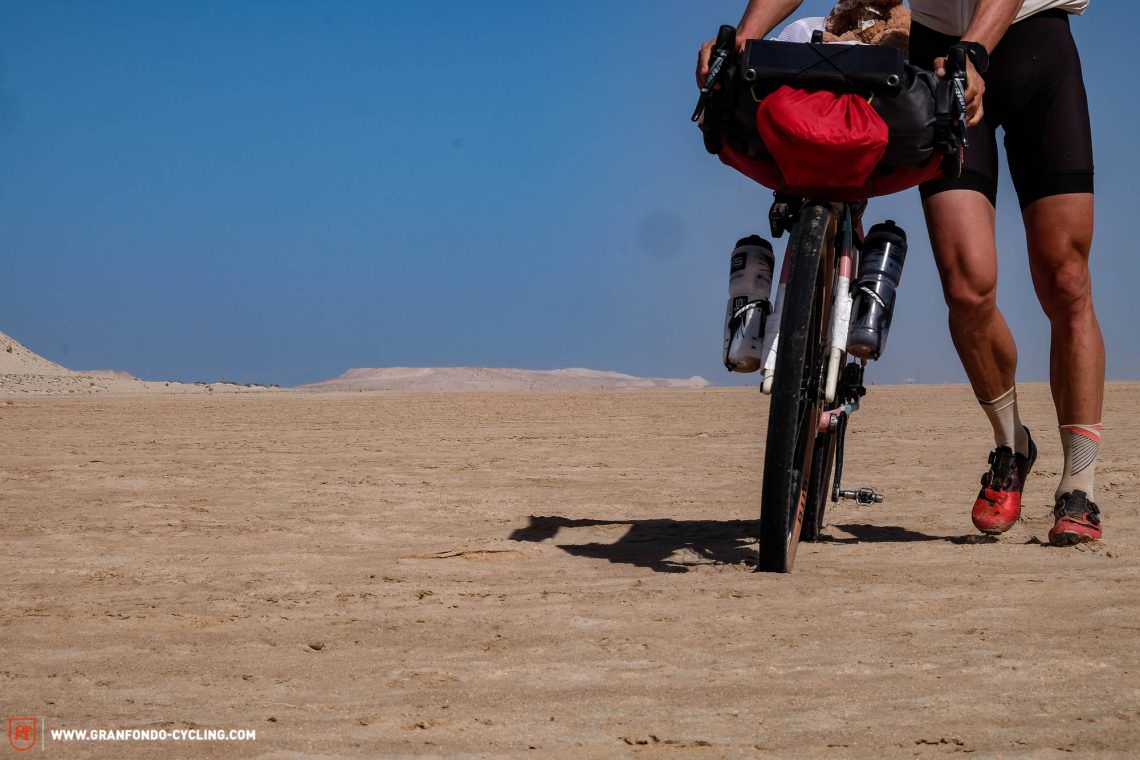
In Port De Laayoune I was even warned not to cycle into Mauretania. As a result of the conflict, there is a 5 km deep stretch of Nomansland between the Moroccan and the Mauretanian border. A stretch with no roads, no government, no law. Trucks, cars and the odd cyclist literally need to form their own path through the sand and the rocks, often getting stuck. I was told I won’t survive to cycle through there. The Polisario, the indigenous inhabitants of Western Sahara, who got pushed into this Nomansland after the Green March, never left this area. They would capture, decapitate me and throw my remains back over the fence into Morocco to blame them for losing a tourist, I was told.
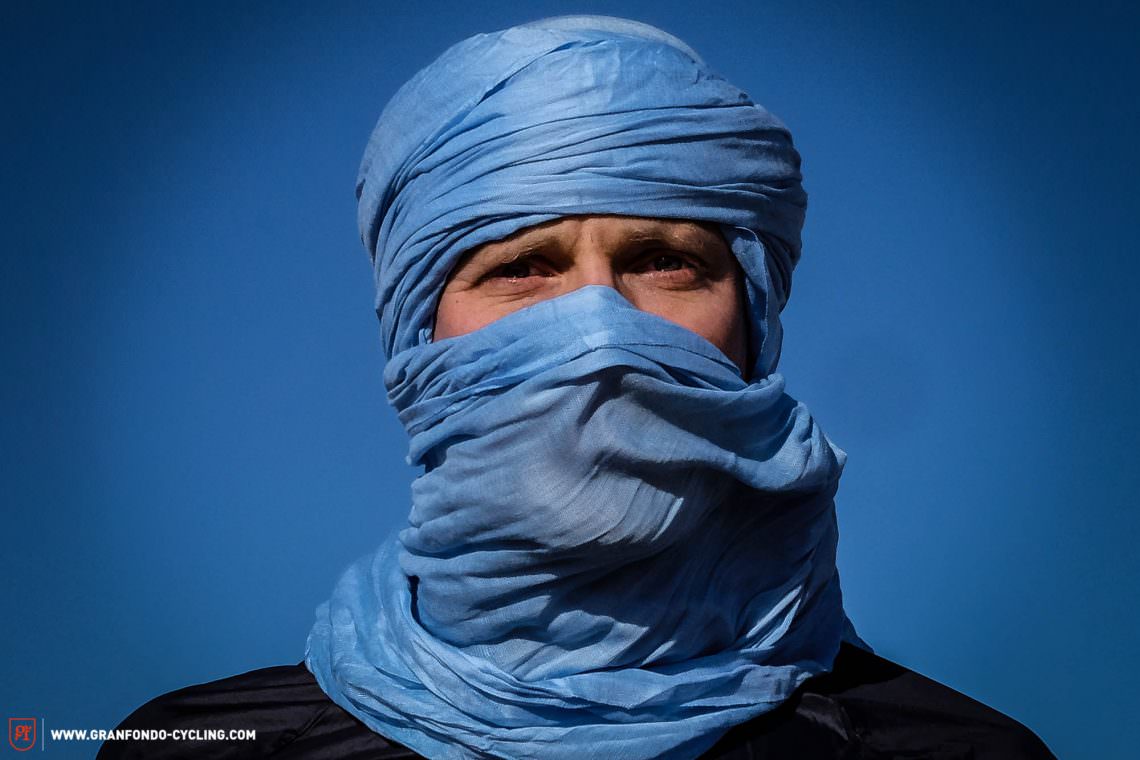
Reaching the border to what Moroccans warned me will be my death
And there I was, standing in front of the border, ready to leave the Western Sahara part of Morocco after an amazing night in the filthiest, most rundown trucker hotel I ever stayed. I arrived at the border after closure the night before and was refused to continue. I was strongly encouraged by the border patrol to stay at one of the truck stops instead of pitching my tent.
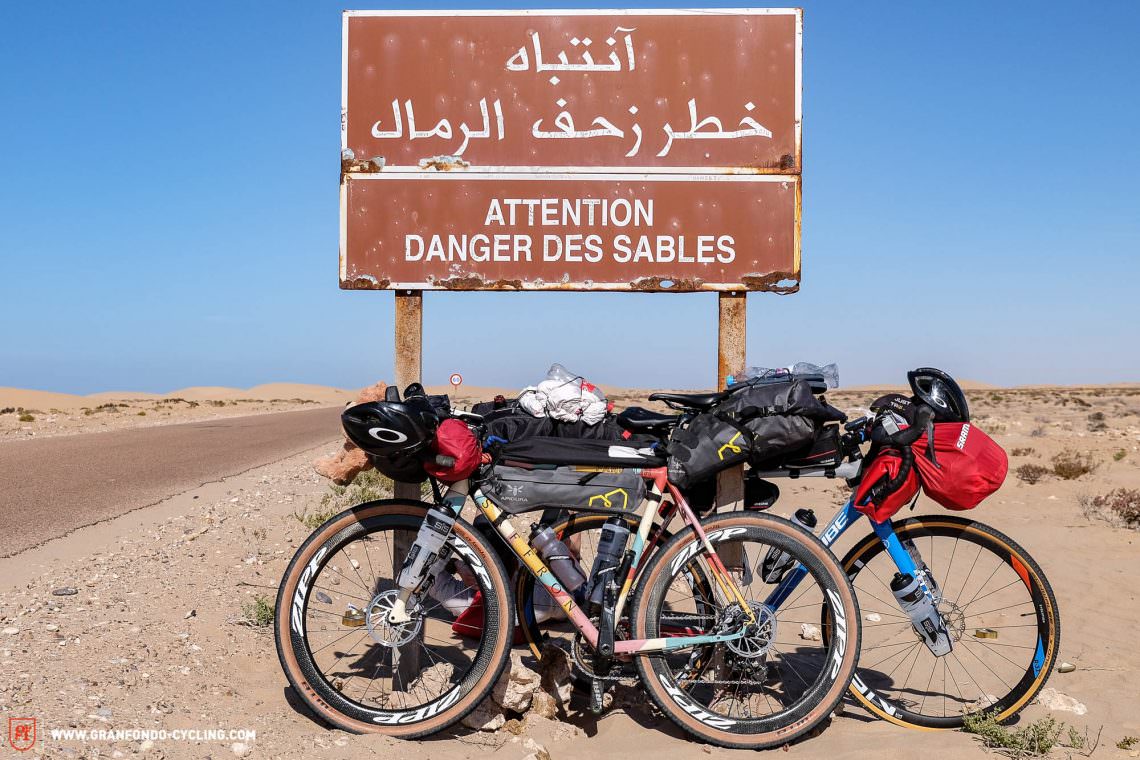
I was first to cross from Morocco into Nomansland in the morning. The first 200 meters are still paved. It is an odd feeling. I don’t believe the stories I was told but something inside me couldn’t entirely shake the tension and suspense. I seemed to be the only awake and living creature in here so far. The cars behind me wouldn’t be following in a while as they all need to unload and get their cargo checked first. I had read articles before how this stretch is basically the real-life version of the darknet. A place where you can buy guns, stolen cars, women and anything you want.
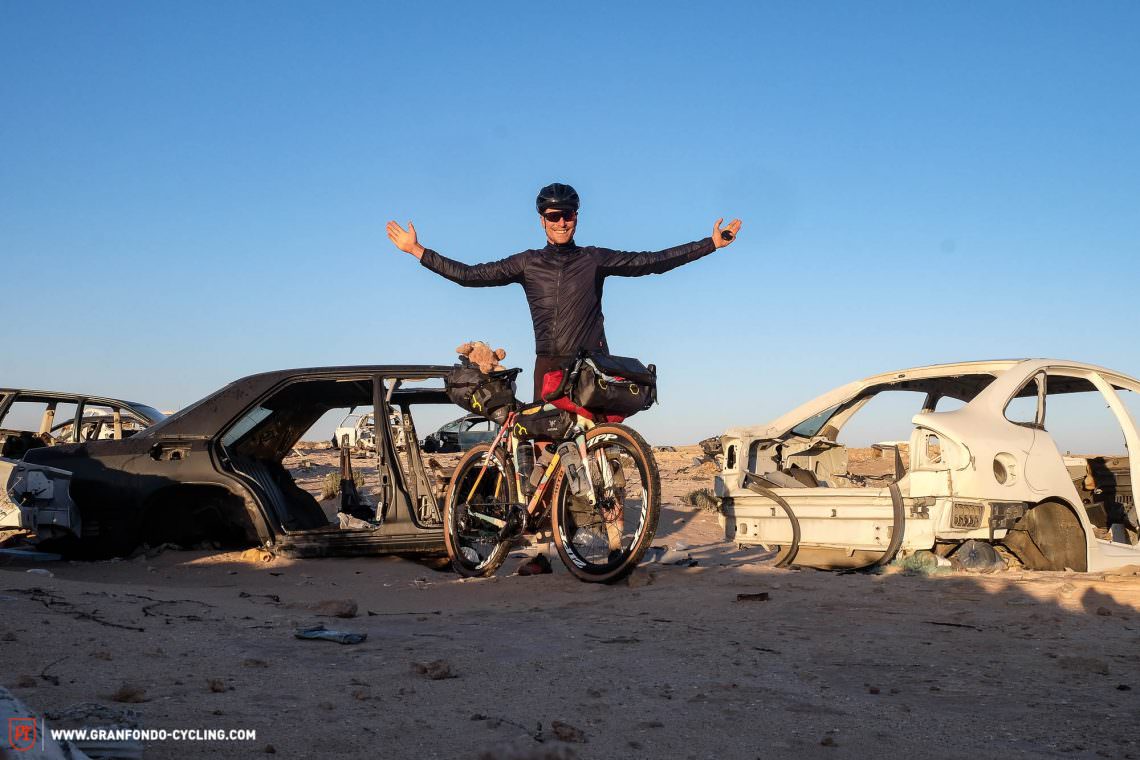
It is early in the morning and my curiosity beats any potential fear. I am amazed by a stretch of ungoverned land that has yet to be fully cleared of landmines by the UN. Only 50 meters to my left and right there are burned-out cars, some stolen and left to die, others exploded on landmines in previous years and burned out before the UN started clearing the stretch.
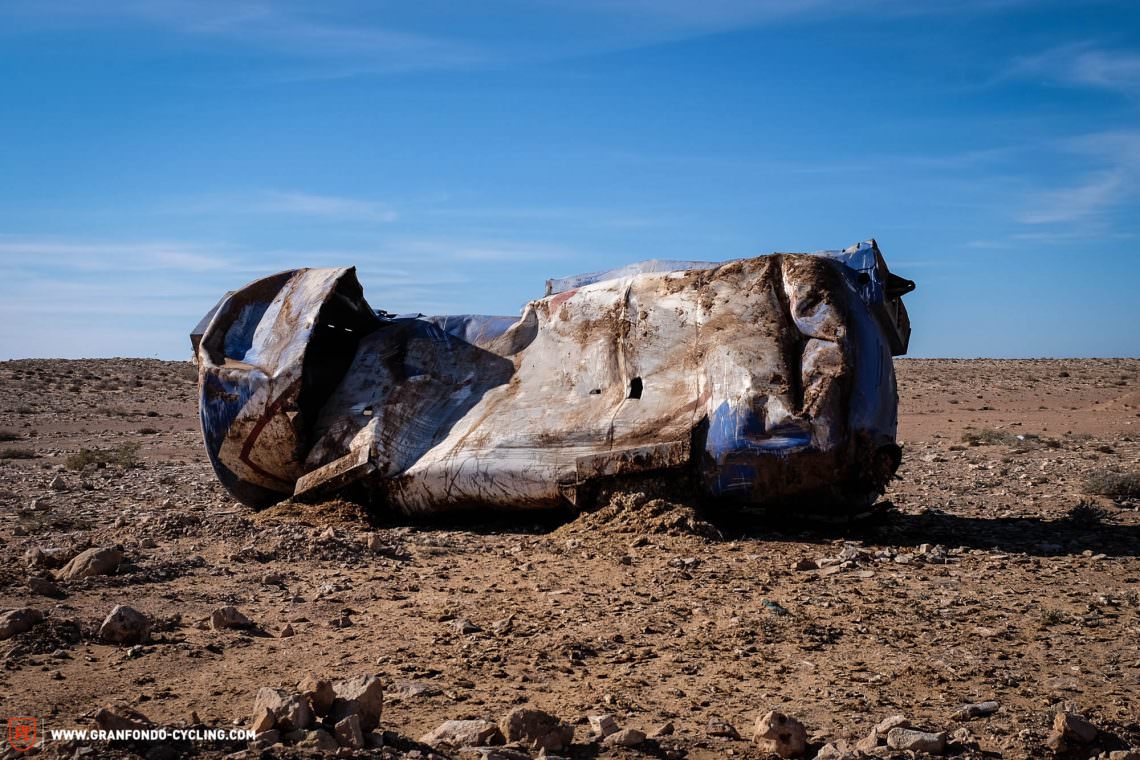
I am drawn in by the mysterious flair of this place and forget everything around me, soaking in the views, the atmosphere, and the special feeling of this place. Suddenly I see a Polisario car coming my way and I continue, only for the car to follow me. I can’t entirely shake the warning words ‘they will capture you and decapitate you’, as I move towards the Mauretanian border with the car following me. The ground is impossible to ride and I am pushing my bike through deep sand and over rocks when finally the first cars crossing the border appear.
Eventually, I make it to the Mauretanian border and enter the more corrupt parts of West Africa. I have heard of so-called service providers in the border area. You pay them, they bribe the authorities for you and therefore the visa process is arranged quickly. Knowing I only have 70 km left for the day I decide not to bribe the police and wait my turn instead. The difference was 45 minutes for those who paid, over 4 hours for me, and a greeting of arrogance and despise by the responsible cop, literally throwing my passport in my direction without ever making eye contact.
The goal for the day was Noudhibou, a coastal town in Mauretania, and stop for the infamous Iron Train that takes you inland Mauretania. A potential experience I can not refuse. The German government strongly suggests not traveling inland but I want to see for myself.
The Iron Train. 17 of the most surreal and amazing hours of my life
The Iron Train (google it) is one of the longest and heaviest trains in the world. It is an iron mining train that allows you to ride in the empty cargo containers after they empty the cargo onto ships at the coast. On its over 20 hour journey to the mine near the Algerian border, there is one stop after about 12- 17 hours in Choum (depending on how long the prayer stops in between are).
I am meeting Esteban, a fellow long-distance cyclist who arrived in town the night before me, we grab a quick bite, he tells me to buy a thick blanket as the train ride is supposed to be absolutely brutal and we head to the train station at 6 pm to wait for the train. Along the way, I am seeing poverty as I have never seen poverty before and I am overcome with an odd feeling of sadness. It is hard to believe how people have to live there.
There are hundreds of people split into little groups waiting for the train. A group of women heading to the village 12 hours away, some mine workers, a bunch of teenagers. With the full moon illuminating the sandy stretch they call a train station, Esteban suddenly pulls out his harmonica and starts playing ‘a wonderful world’. A truly special moment showing the power of music. Within two songs almost every group has caught on to it and a big bunch of strangers is coming together, sharing an amazing and peaceful moment of music in the dark.
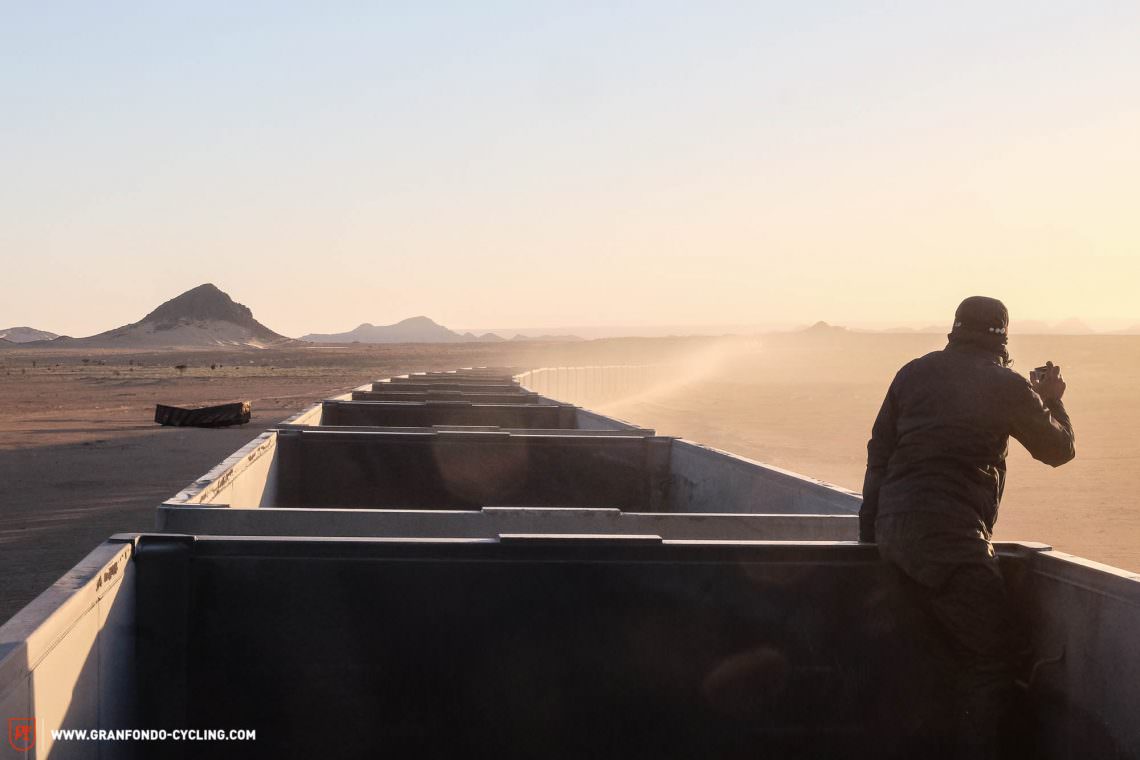
The train eventually arrives and with some help, we somehow manage to maneuver our heavy bikes and bags into the 5 meter high cargo containers. It is not like the train is waiting for people to board. Either you are fast or you are staying behind. What follows is one of the most impressive and lasting experiences of the trip for me. 12 hours through the night on the floor of an open cargo container. Within minutes the remaining iron dust and desert sand have turned our faces and everything else black, the wind is howling and temperatures drop to almost three degrees. We inhale iron dust and despite everything we are wearing we are freezing with every move. I spend the night under a 3 x 3 meter blanket, freezing at every move and I get a slight first taste of what survival instinct must feel like. Not that I ever feared for my life on this trip but I guess the instinct kicks in way before that. I am suddenly grateful to have a complete stranger lying next to me, we lie close together benefiting of each other’s body heat in the night.
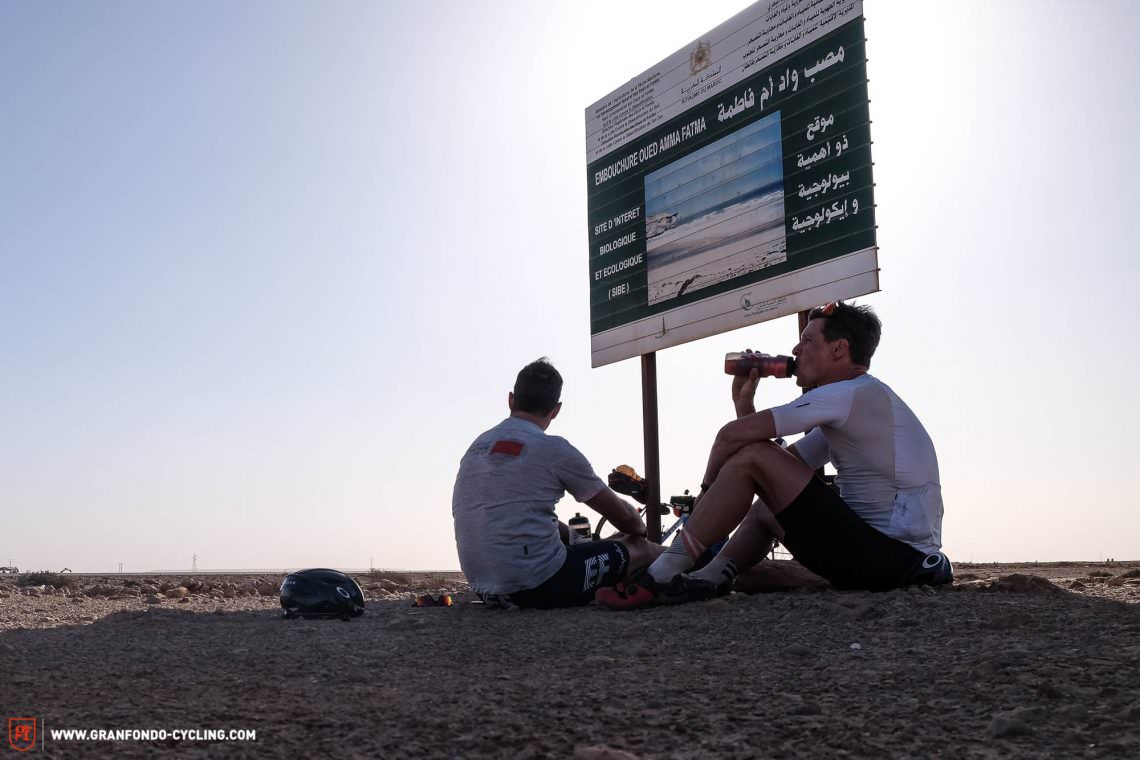
Breathing is only possible through a Berber scarf covering our mouths. We are sleeping in the dirt, on the floor, none of that matters anymore. I know I need to sleep no matter what to make it through the coming days and suddenly I fall asleep in conditions I could never sleep in back home. When the train stops in the middle of the night for prayer stops, the compartments slam into each other as if the train is getting derailed. We quickly figure out that there is a short moment of warning in form of an intense whistling sound as if a jet plane was about to crash into us.
We make it to the morning and the first rays of sunshine bring a certain warmth. We are in the middle of the desert, the sun rises behind a mountain and we are climbing up on the side of the container to see the magic unfold in front of us. The bread and fish we had bought in the city for the trip are covered from top to bottom in iron dust. Who cares, it is either this or nothing and nothing is not an option. At least we don’t have to worry about an iron deficiency.
After 12 hours we make to the little stop in nowhere, quickly throw our bikes overboard, almost not making it off the train and by the time we are off the train ourselves, our bikes and bags are surrounded by roughly 10 kids who in seconds had opened our bags, stolen our electronics and tried to get even more out of us. After a lot of swearing, threatening and eventually involving a local soldier, we got back everything we realized they had stolen. I only realized later in the day, when I need them, that my bike lights had gone as well.
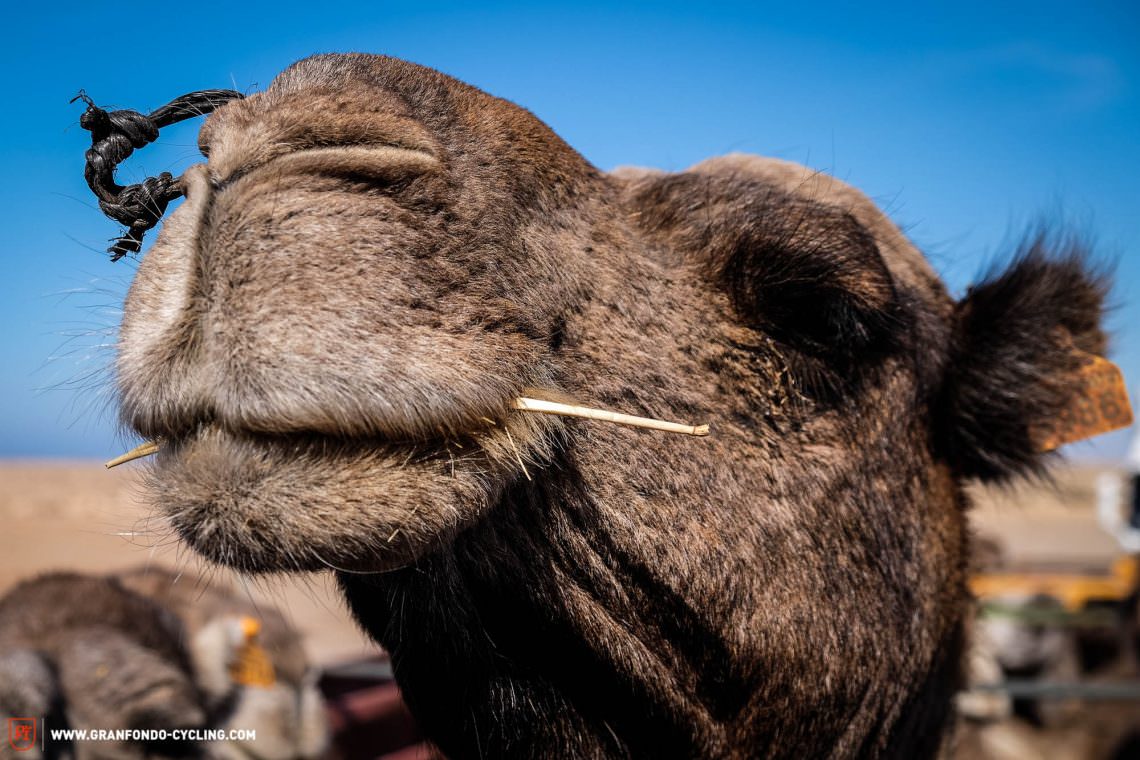
The journey back to civilization begins
What awaited us was a 110 km headwind trip, with 3 mountain passes over roads partially disappearing in the sand to make it to the next city. I quickly left Esteban behind who rode half my pace and it became clear he would have to stay in the desert for the night. I eventually made it to Atar and found shelter for the night in this buzzing and amazing city. I tried finding a replacement valve for my air mat as mine had broken on day three of the trip but no luck and so I kept sleeping on an uninflated mat. The next day the winds changed and I put in a solid and amazingly beautiful effort to Akjoujt, giving me hope that I could actually make it to the coast and the capital of Mauretania the next day. 240 km remained for that day.
I got up with the first light and attacked the day but the desert had slightly different plans for me. After a few kilometers, I saw a sandstorm brewing on the horizon. It felt a bit like in a movie. It was something I had seen in films but never in real life and so I continued on, not knowing what it means being in a sandstorm. I traded my helmet for the Berber scarf to cover my mouth, head, and face and continued as the sky got darker and darker and sand covered the air. Eventually, even the trucks and cars stopped driving as visibility went really low and it was hard to see the road but not knowing how long a sandstorm could be, I decided to ride on. What choice did I have? There is no shelter in the desert and I didn’t have enough water and food to really risk a night in the desert. I continued deeper into the sandstorm and shortly after experienced the most horrific moment of the trip. A truck must have hit a camel, breaking its legs and opening up its stomach. That is how I found it sitting on the road, unable to move but making bone-shattering sounds of agony. I contemplated for a moment taking the leatherman to its throat but decided to continue on.
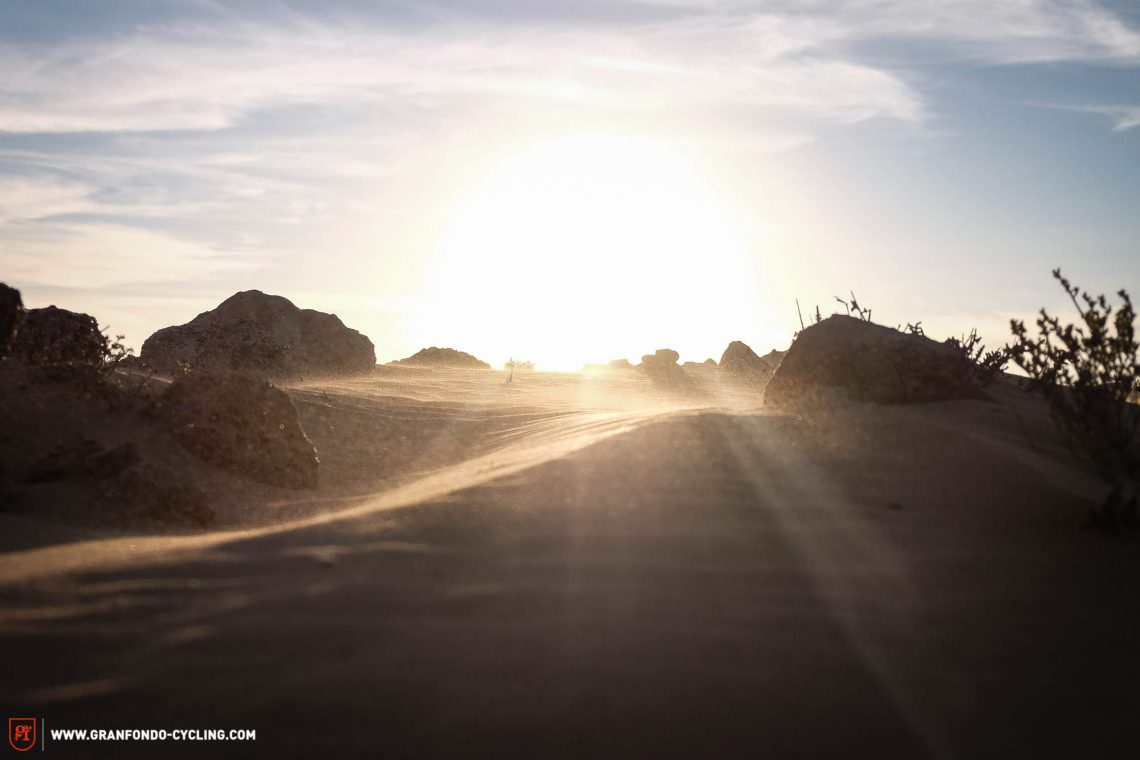
After 80 km of cycling in something that felt a little like a parallel world or a dream, the sandstorm opened up and I found a place to refill. I was starving and loaded up with everything I found. Finally, the sandstorm was over after 80 km. So I thought for 5 km until I was hit with ‘sandstorm part 2’ for another 40 km. At least by now, I was basically an experienced sandstorm guide and just put the head down, eventually making it to the capital of Mauretania where I spent the night. I stayed with a bunch of cyclists and bikepackers and we enjoyed a fun evening out at fun places like “café youtube”. Ripping of brand names seems to be a real thing Nouakchott.
A tale of epic rides, wipeouts and seeing absolutely nothing
40 km into the ride the next day I caught up with one of the guys I stayed with the night before. The funniest kid from Hungary on his beat up touring bike he bought used for 100 Euro a few months before when he decided out of nowhere to pick up bikepacking. That he ended up on this road in Mauretania was pure chance chosen by a coin. This chance encounter led to two amazing days. We pushed onwards for 200 km towards Senegal. The roads in this part of Mauretania got worse and worse and the begging more and more aggressive, with kids throwing rocks after us as we rode by. We made it to the entrance of the national park 40 km outside the Diama border crossing to Senegal and as fate would have it my riding buddy loves stupid ideas just as much as I do and we continued on into the national park. 40 km of completely washed out sand paths with close to no visibility. I still hadn’t gotten a new bike light. So we shared his as we rode on into the dark.
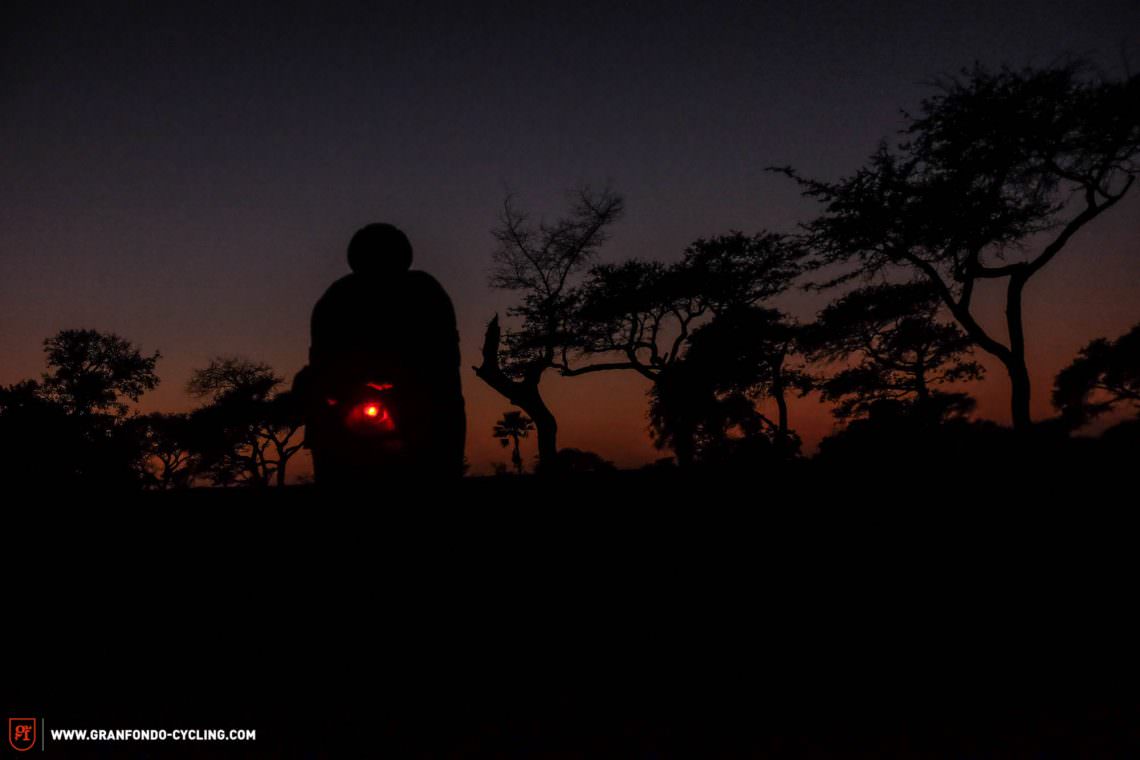
It was an amazing feeling for the senses. We could barely see anything, complete darkness around us, no light from any cities nearby. Only the reflection of eyes staring at us from the bushes as the bike light made contact with some animals hiding along the road. The roads were brutal, washboard style, deep sand roads. It took us 4 hours for 40 km. We must have crashed a gazillion times, wiped out in the loose sand, breathing sandy air. It was midnight and a 12.5 hour day in the saddle by the time we pitched our tent outside the Senegal border and went to bed without food or water.
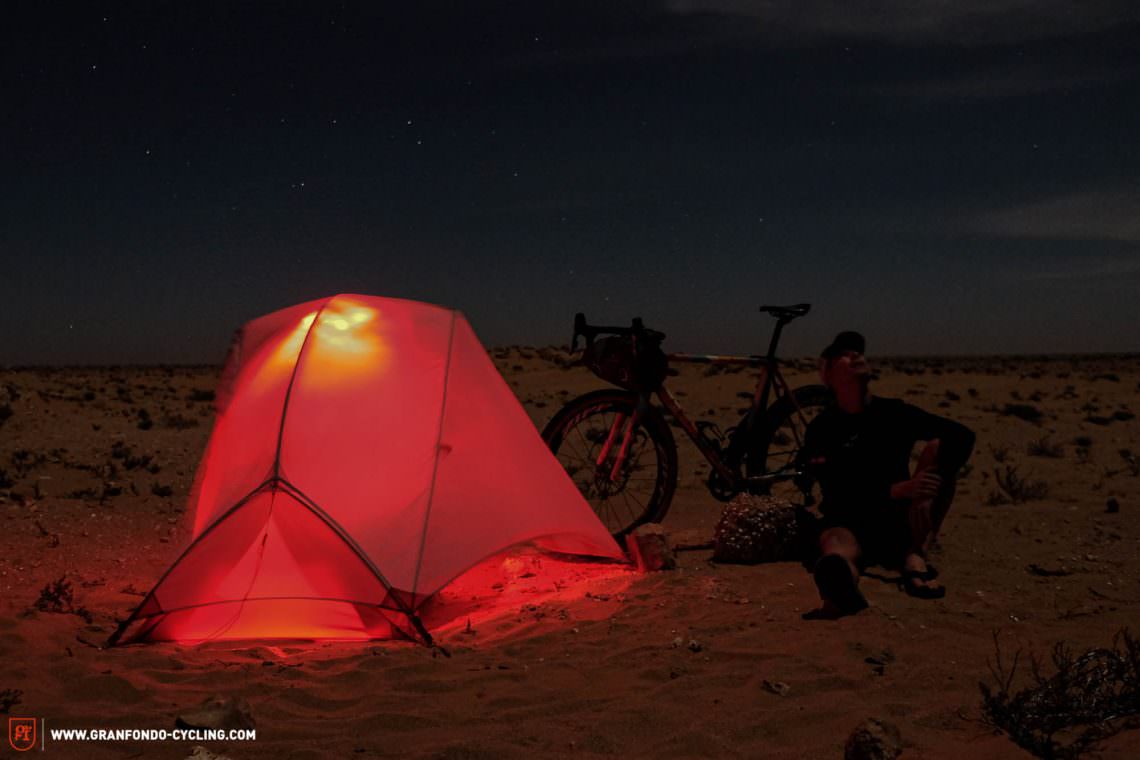
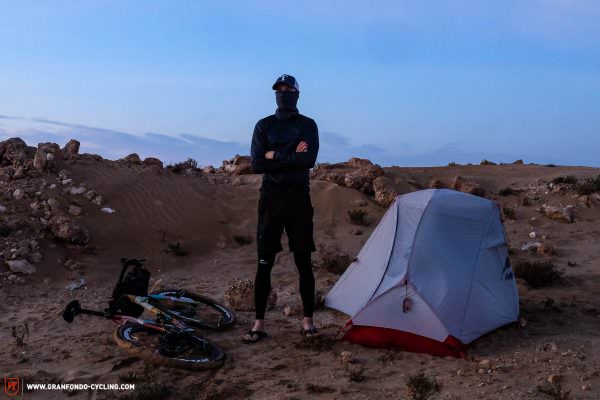
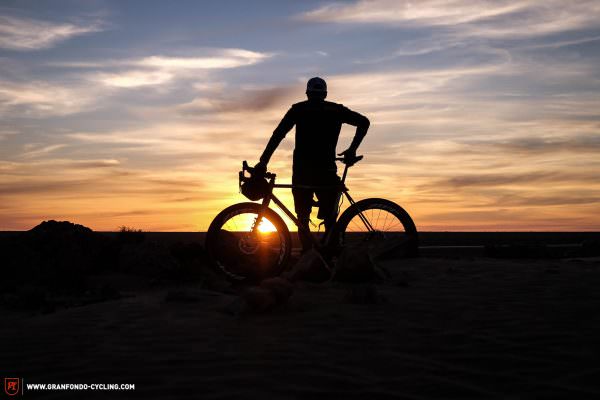
We had completely run out and the border control decided to pretend to not even hear our voices asking for water, standing 10 meters away from us behind the fence. After crossing the border after another tent night in the dirt, chased by mosquitos every time we switched on a light, the world and experience changed entirely. We headed into Senegal, the countryside instantly turned green, there was water, people were outgoing and laughing, couples holding hands in the streets and showing affection. There was fresh fruit from local trees and the buzzing city of St. Louis. In Mauretania, public affection or even holding hands was not permitted. People were friendly but very reserved. Senegal was the complete opposite.
A story Hollywood could not have dreamed up
About 450 km before making it there, in the beginning of my sandstorm adventure my Crankbrothers pedal had given up work and the housing had come off the axle making for a very interesting riding experience for 450 km with my foot coming off the axle every 20th turn, me losing the cleat in some sand patches 3 times and my knees showing some signs of remote unhappiness about the new situation then and there, a story you couldn’t write up or dream up, started.
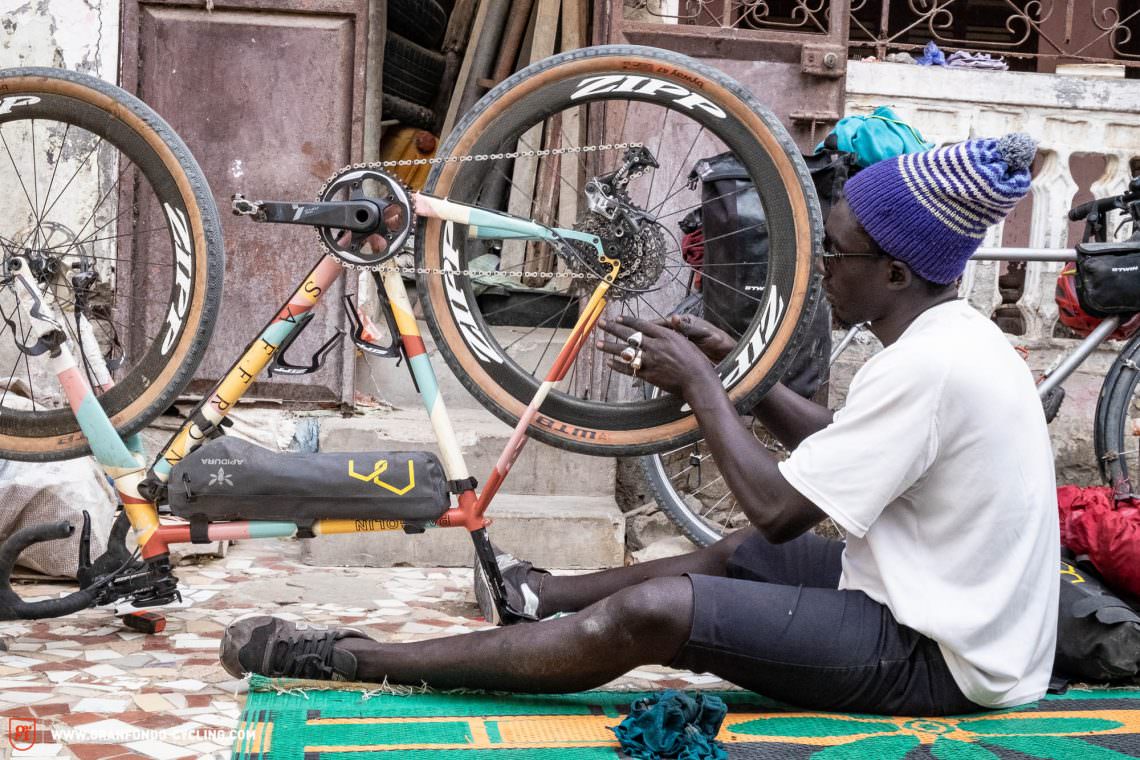
Dan Craven, also known as Dan from Nam had built the Saffron-Pangolin collaboration frame I was riding across Africa. He saw me posting about the pedal issues and turns out that he raced and won Tour de Senegal in 2018 and their team mechanic lived in St. Louis, Senegal. He made the connection and the mechanic picked us up, through some miracle with the help of some locals found the most run-down but still working, super rusty pedals and cleats and my issues were fixed. He then invited us to stay with his family and invited us over to their home where we cooked in a courtyard on the floor with kids, goats and chicken running around. They had close to nothing but insisted to host us, invited us for food which we all shared among 8 people sitting around a big bowl on the floor, digging in with our hands.
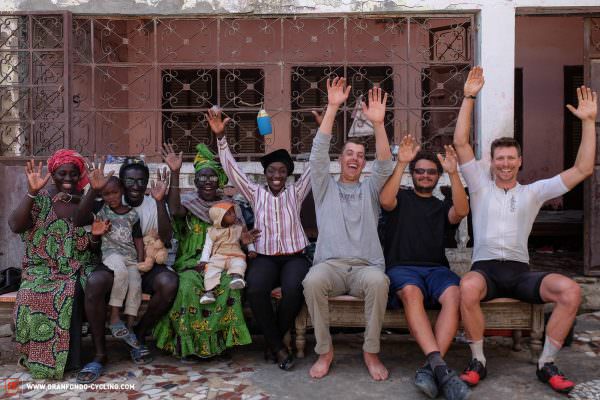
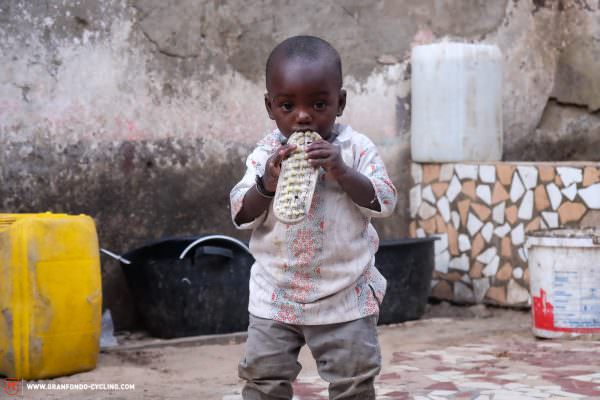
After 3 hours of sitting in the courtyard out of nowhere, I suddenly had the feeling of wanting to see what was going on outside in the street and that very second the backpacker we stayed within Nouakchott two nights before, walked by, not knowing we were staying there and that’s how he ended up staying with us for dinner and the night sharing a room among the three of us. We stayed with the family cooked together, they serviced our bikes, we helped them repair their shoes and we had an amazing time together and by the time I left the next morning our backpacking buddy Ben had been reformed and headed out to buy a bike for himself to start bikepacking.
Dakar, the biggest hell hole I’ve ever been to
Amazed by this experience I struggled a little bit for the first half of my day, uncertain if it was the right decision to continue on but then my sights were set on Dakar. Everybody I met told me it is one of the worst cities in the world and I should skip Dakar and head across inland Senegal to Gambia. I need to see for myself how bad Dakar was. After all the plan was to end my tour there, spend a few days at the beach, and then fly home.
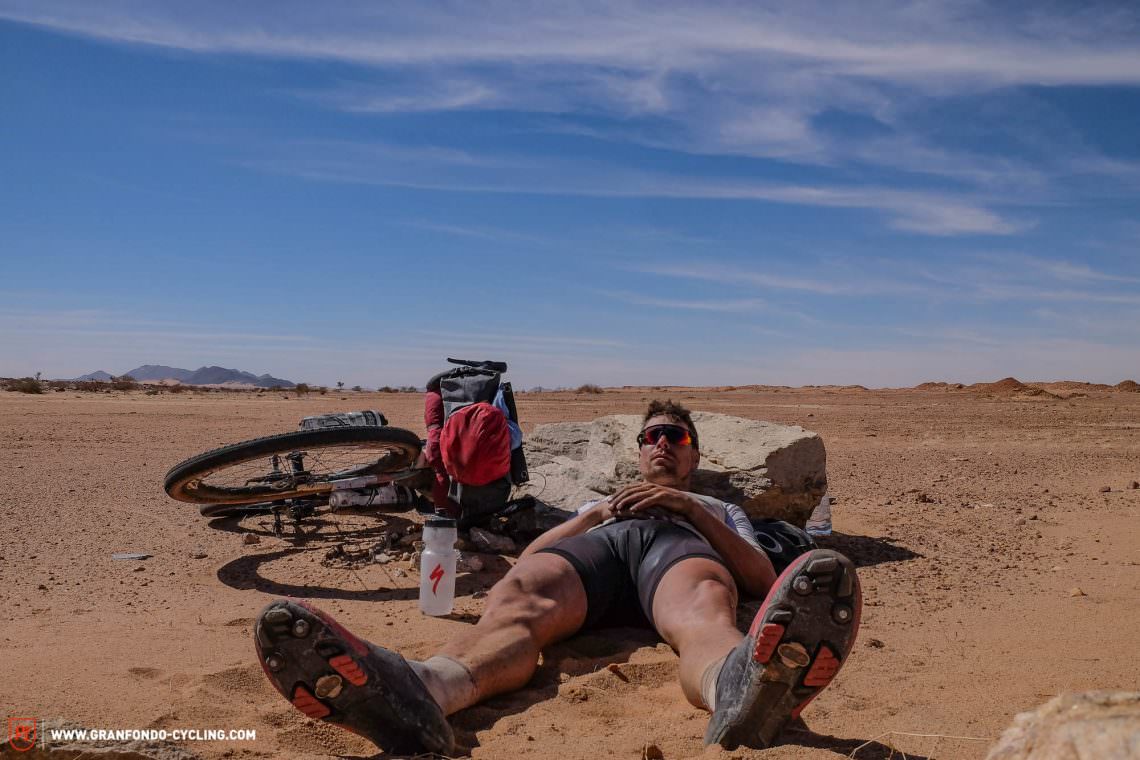
Well, let me tell you, Dakar is the biggest hell hole I have ever been to and what followed was the worst 260 km of cycling in my life. The industrial outskirts of Dakar stretch on for almost 45 km with unbelievable traffic and chaos. You see the cloud of smog from afar and breathing gets hard in the city. Dodging cars and trucks heading into the city felt like a computer game and it was more of a ‘close your eyes and hope for the best’ situation. I finally made it to the beach and instantly realized, this can not be it. This can’t be the end. No way. So after a coffee with a friend and already 100 km in the legs I decided to leave and head on back all the way inland Senegal and try to make it to Gambia.
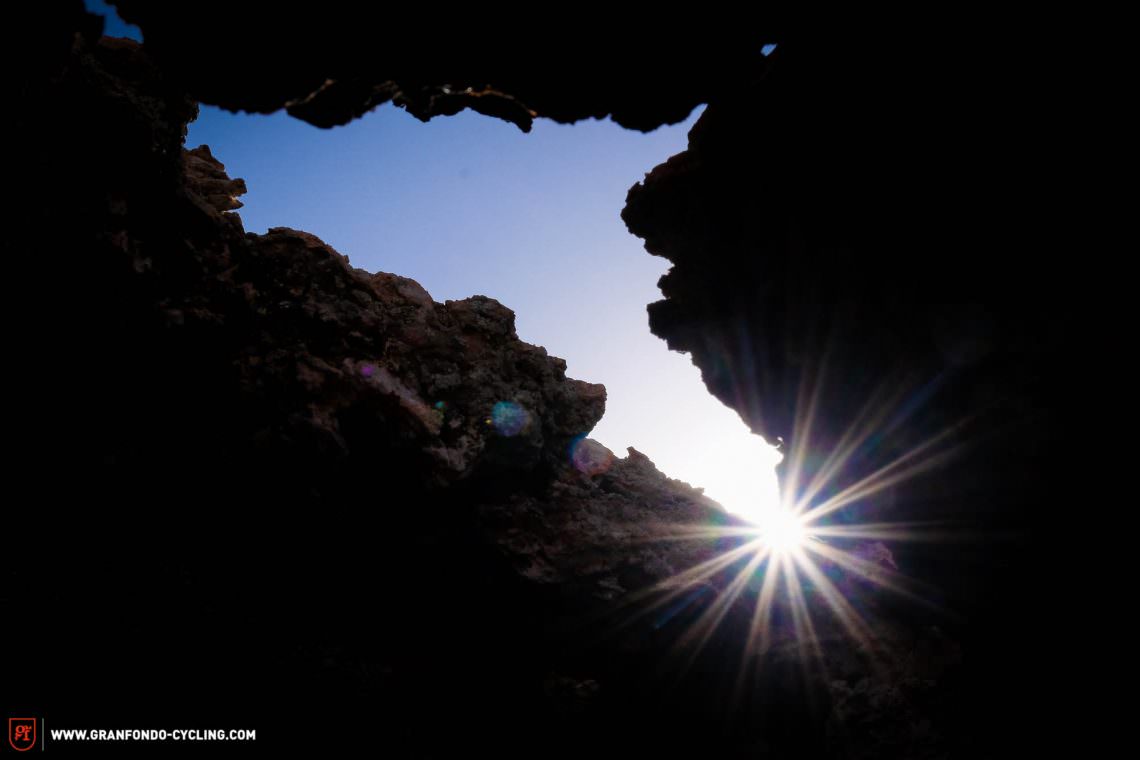
The sun was absolutely burning and admittingly I had this anger and rage inside me already when I finally made it out of Dakar again and things turned even worse. Turns out I was looking at a 190 km stretch of the main trucking route through Senegal. There was nothing pretty and truck drivers displayed a total disregard for human life. If I didn’t jump off the road when they honked from behind, no matter if they had space to pass or not, they would pull next to me and then close the door with the trailer of the truck, forcing me off the road. Not once but maybe 10-15 times.
A wrong turn, a lack of sugar and getting held hostage as the result
I continued on for another 80 km when I took a wrong turn and the road quickly turned into a gravel road and then a sand path. Sadly I am not a smart person and I don’t possess this “oh I took a wrong turn, let’s turn around and get back on track’ instinct. It is more a ‘let’s push on, this ankle-deep sand path must lead to somewhere’ situation with me.
By the time I made it to civilization it had gotten dark and was 10 pm. I arrived in the dodgiest village I had experienced so far and for the first time on this trip, I did not feel safe camping wild. Thinking I am a smart guy I checked in with the police to see if they could suggest something or let me pitch my tent on their compound. They welcomed me with open arms, called a barely English speaking gentleman ‘who I could totally trust and should follow’ they said.
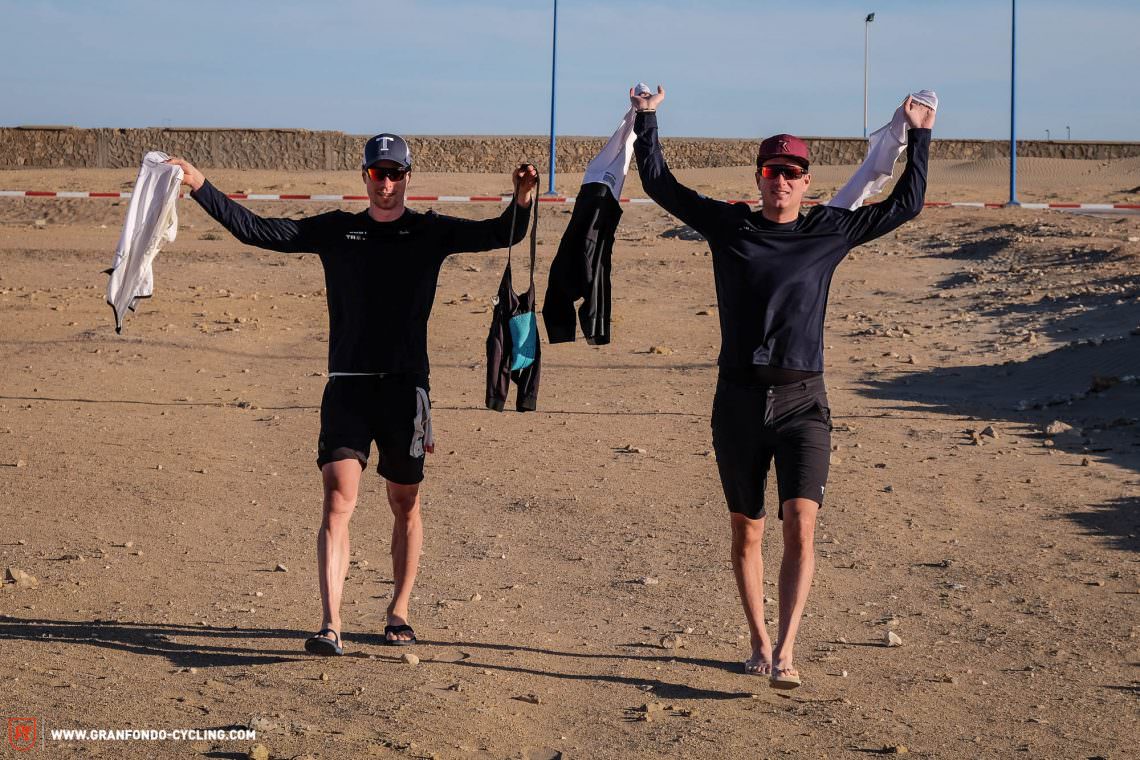
He hopped in a car and I chased him through town, in the dark, with no light, shooting intervals at 50 km/h after a hellish 190 km day on the bike. I followed him into the darkest corner of the village until we finally reached a compound secured by walls and steel gates. I was done. Completely cooked. I hadn’t eaten in too long, had no water left, was burned out. He showed me my room and then told me that I was not to go out or open my door under any circumstances as this was ‘a very dangerous neighborhood’ and that’s when the scheme began. I was told the steel gates would be closed now and I could not leave before I gave him all my money. Oh great, I suddenly found myself in the middle of a rip off scheme orchestrated by the local police. Fighting didn’t seem a smart choice and so I handed over my money but his face instantly made it clear, this wasn’t enough.
I was told I will be picked up in the morning when the banks open and then I could get him more money. The door shut behind me. I was too tired, too hungry to even consider if I should be scared or not. The remote survival instinct kicked in again (again, I wasn’t afraid for my life. I truly believe they were only after my money) but I instantly became oddly efficient in my thinking. I had no dinner after the 3rd brutal day of riding in a row, I knew my body would break down and my only chance to get out of here was to make sure I would get some sleep, get up early and try and find a way to escape. After a short night with night sweats and fever, I got up with first light, found a metal pole, jammed open the lock of the steel gate and chased out at 6:30 am.
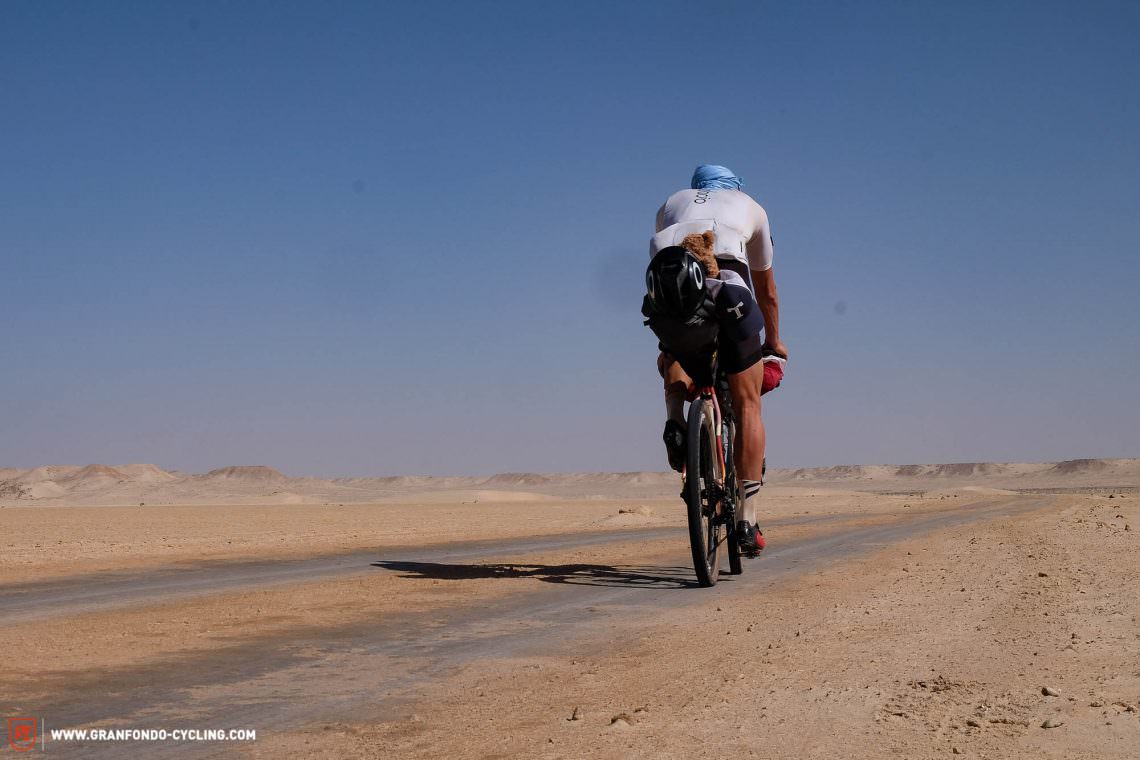
5 hours towards hell and another 7 to paradise
I almost raced the first 8 km into headwind out of town, fueled by adrenalin and then in an instance my wheels came off. I had no energy and I went out too hard. I had no cash left, only a few coins. Enough for 1 bottle of coke and 1 banana. Not even remotely sufficient for a 110 km brutal headwind day. It took me 5.5 hours to make it to the next big city where I knew I would find a bank and get some cash and with that food and water. I set myself little goals of 10 km intervals and eventually made it. It was a feast.
Disgusting amounts of Coca-Cola and candy bars later I felt a little better and decided to continue a little towards the Gambia border which was still 100 km away. I knew that 30 km later the road would turn and I would have tailwinds. “Make it those 30 km” was the plan and as I reached that point the sugar had kicked in. “Let’s do another 30 to the next town, there is still daylight, I can do another 30, now it is only 40 to the border, I can make that, I have 1 hour of daylight left and only 25 km to the ferry to the Gambia peninsula, I am at the ferry, if I take it now I only have 16 km in the dark left to my final destination and I won’t have to get back on the bike tomorrow” – that was about what was going on in my head. The delta surrounding the Gambia border was stunningly beautiful and motivating, traffic had died down and the thought of ending the trip on this sudden high note was too appealing.
Enough motivation to continue, enjoy one more adventure by taking the local ferry to Gambia, a ferry commonly called by every international organization a ‘death trap that needs to be shut down’. I didn’t care. Just make this ferry and then the last 16 km and eventually at 11 pm this day I made it to Mama’s Guest House in Gambia.
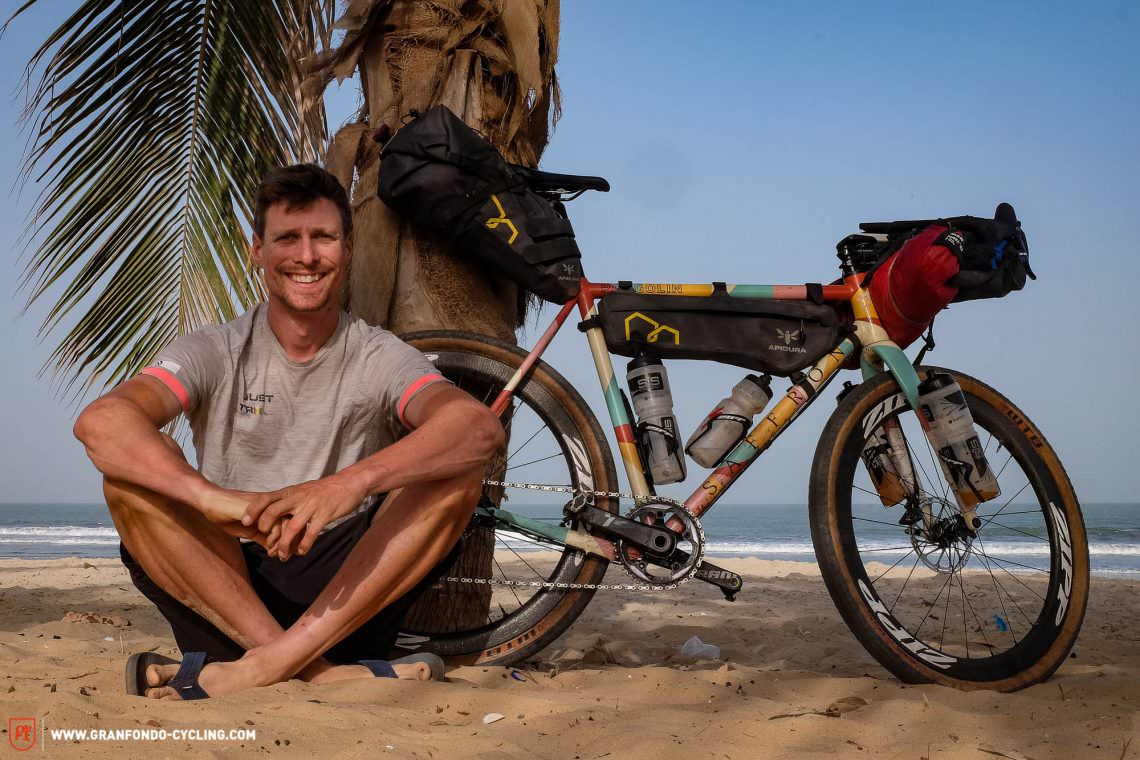
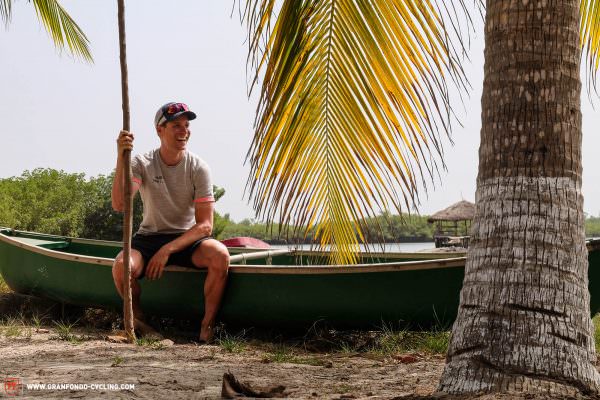
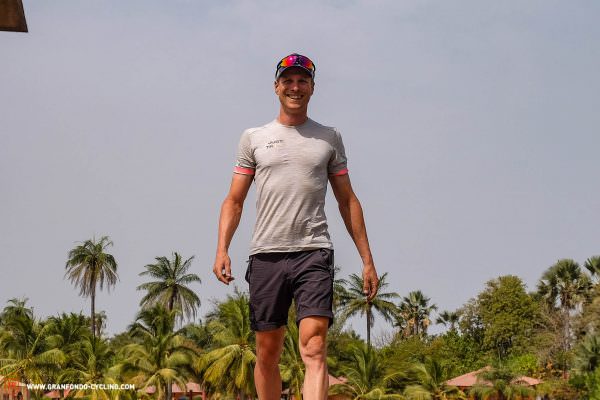
21 days, 141 hours in the saddle, 3100 km and a consumption of roughly 50 litres Coca-Cola later was I greeted in Gambia by the amazing couple that is Nomadtrails, who are cycling the world. They had ordered me some food that was waiting for me. I didn’t even wash my hands. Didn’t care. All I wanted was to eat.
I had a few days left and maybe could have made it all the way to Freetown but decided to end the ride right there and let it sink it. It was the perfect decision. A few days of stunning beaches, getting to know the locals, spending evenings cooking with fellow cyclists, and walking around barefoot all day. I will never forget this trip and one thing is for sure, I am hooked. The next, bigger, longer, more adventurous trip is already in the making.
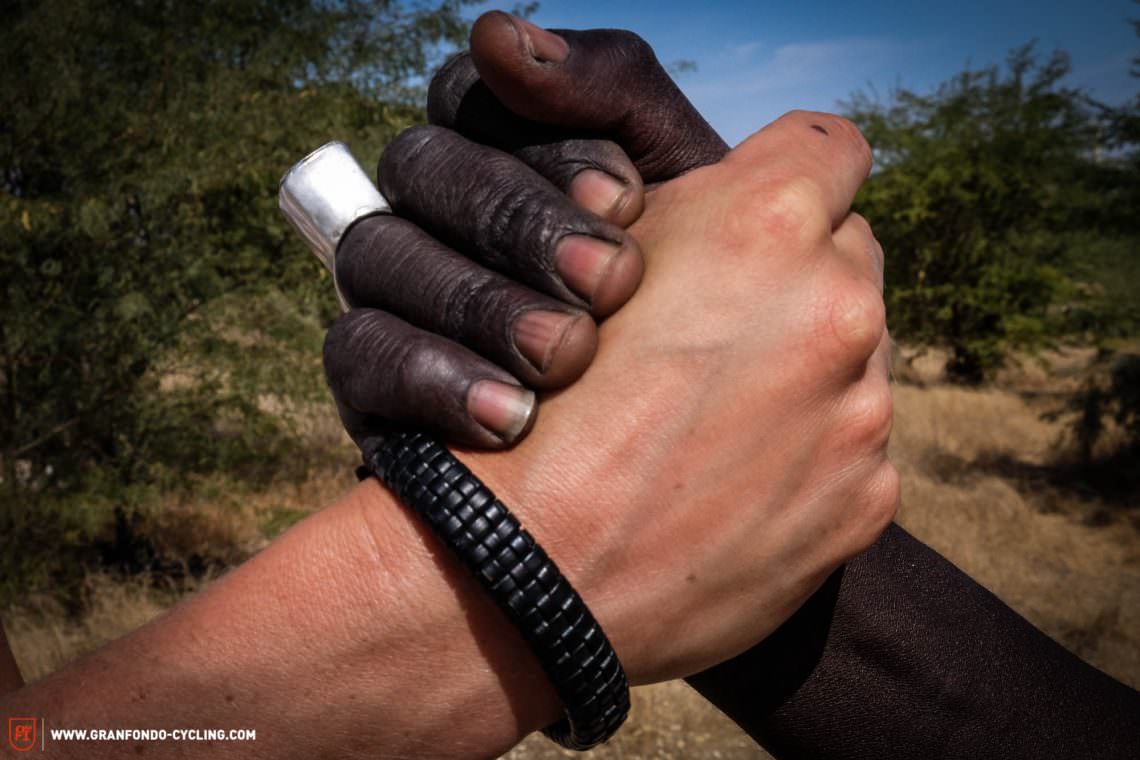
Hat dir dieser Artikel gefallen? Dann würde es uns sehr freuen, wenn auch du uns als Supporter mit einem monatlichen Beitrag unterstützt. Als GRAN FONDO-Supporter sicherst du dem hochwertigen Bike-Journalismus eine nachhaltige Zukunft und sorgst dafür, das die New-Road-Welt auch weiter ein kostenloses und unabhängiges Leitmedium hat. Jetzt Supporter werden!
Text & Fotos: Till Schenk


